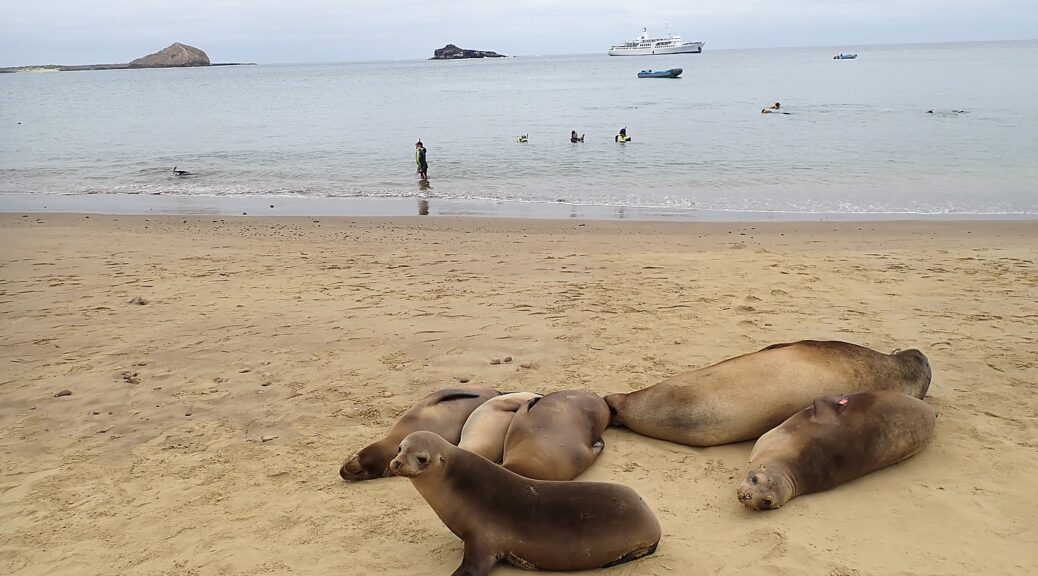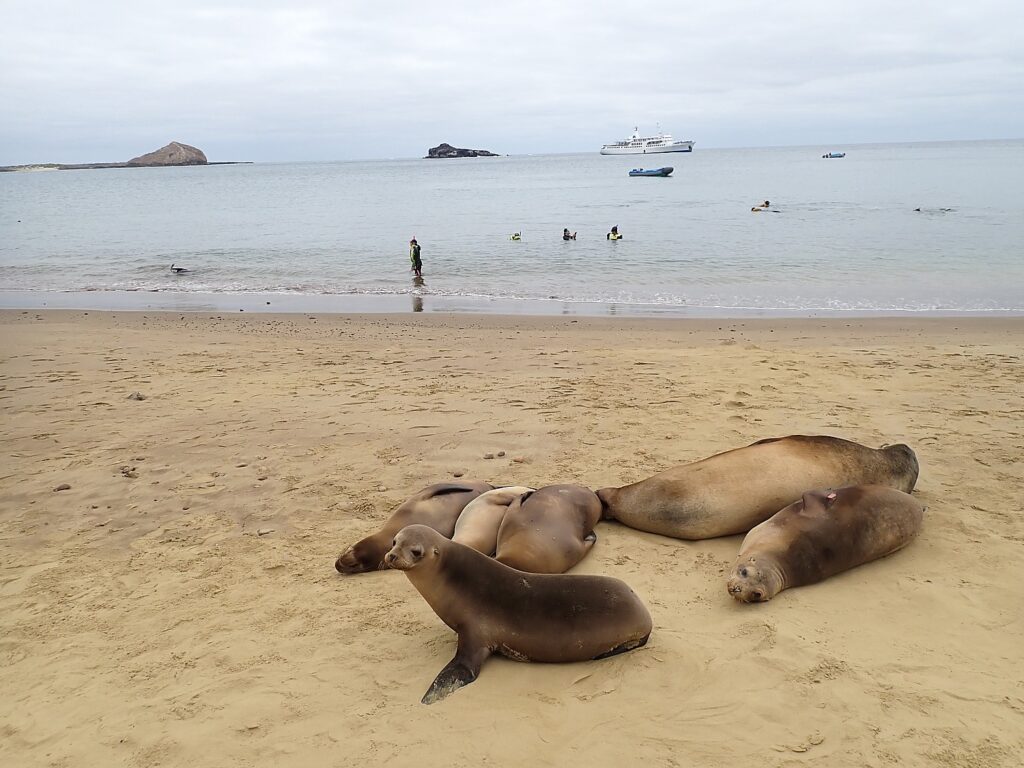
By Karen Rubin, Dave E. Leiberman, Laini Miranda, Eric Leiberman & Sarah Falter
Travel Features Syndicate, goingplacesfarandnear.com
We have our longest, and roughest, sail over the second night of this three-night, four-day cruise aboard the 100-passenger Galapagos Legend. Our guide, naturalist Alejandro, tells us to keep doors closed so they don’t slam. Actually, it feels more like being rocked in a cradle during the night. (While the weather is temperate year round and the Galapagos is visited throughout the year, in this, the dry season, is when the seas tend to be rockier. In any case, we’ve prepared by taking a motion sickness pill and not drinking any alcohol-well, Karen abstained.)
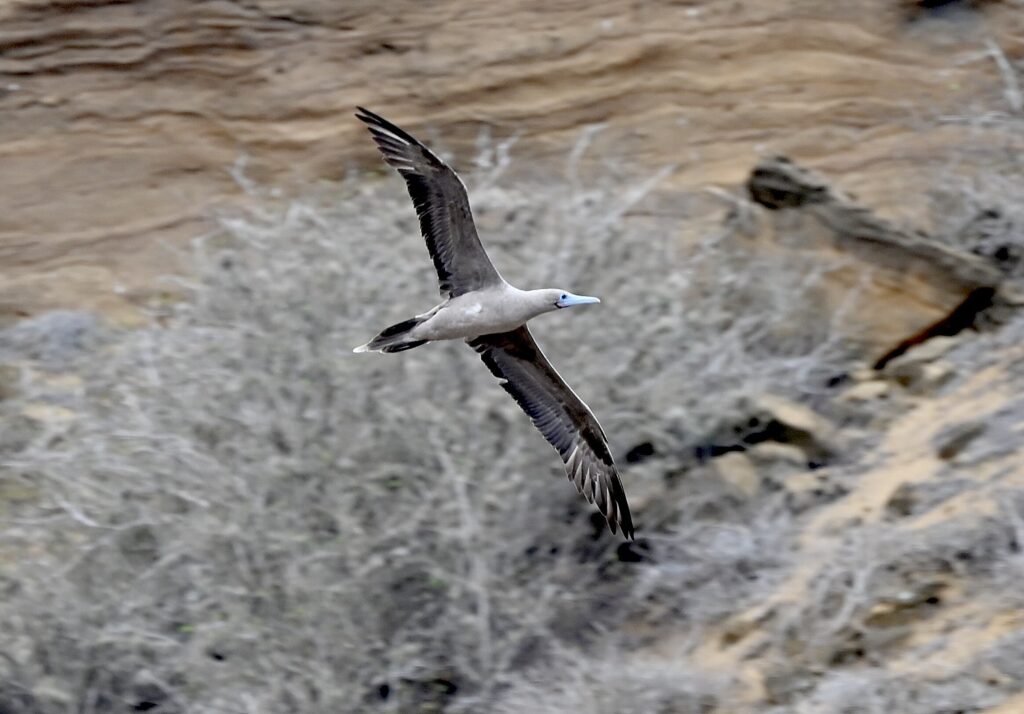
We sail to Punta Pitt and Pitt Islet off San Cristobal Island, the easternmost island, closest to South America’s coast (600 miles away), the oldest island and oldest settlement in the Galapagos. Here we first have a marvelous, two-hour hike to the high point of a steep, eroded tuff cone. Here is the only opportunity to see all three booby species in the same place: the red-footed booby perched on small trees, the Nazcas which nest on the ground near the cliff edge and the blue-footed boobies inland. Frigatebirds fly around and the views are stunning. Notably, we see how hardy vegetation takes hold in such a volcanic barren land – saltbush, spiny shrubs, Palo Santo trees, cacti, and, because it is the dry season, we get to see stunning carpets of red Vesuvius.
While it seems that most of the time, the animals we see ignore us, as we walk the trail, a blue-footed booby (adolescent?) seems curious enough to just stand in the middle of the trail as we take photos, study us, and wait until we came back.
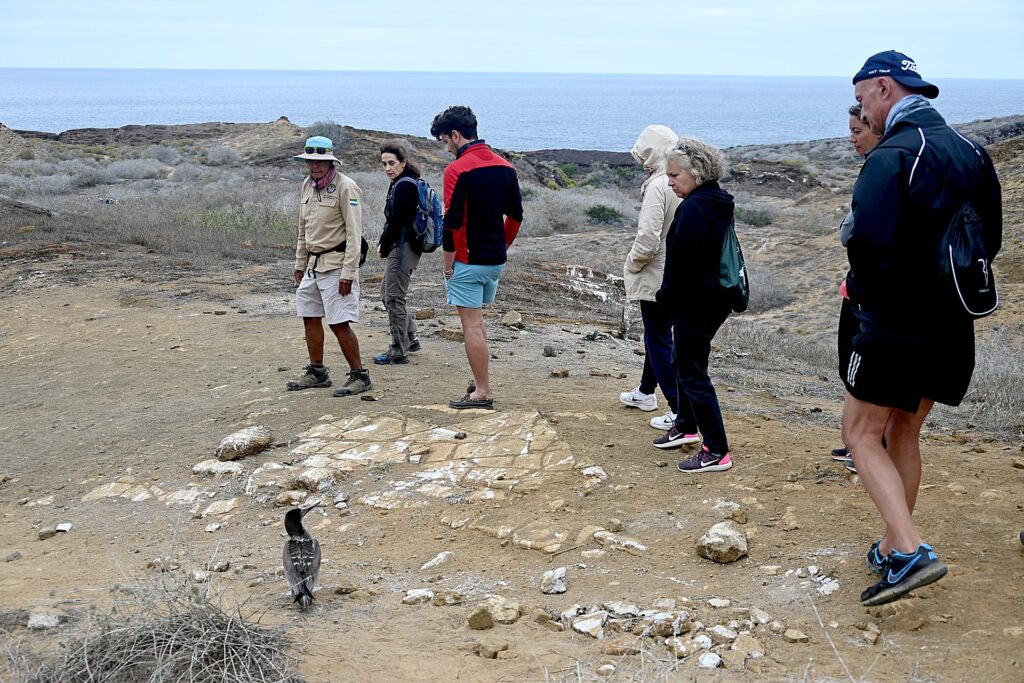
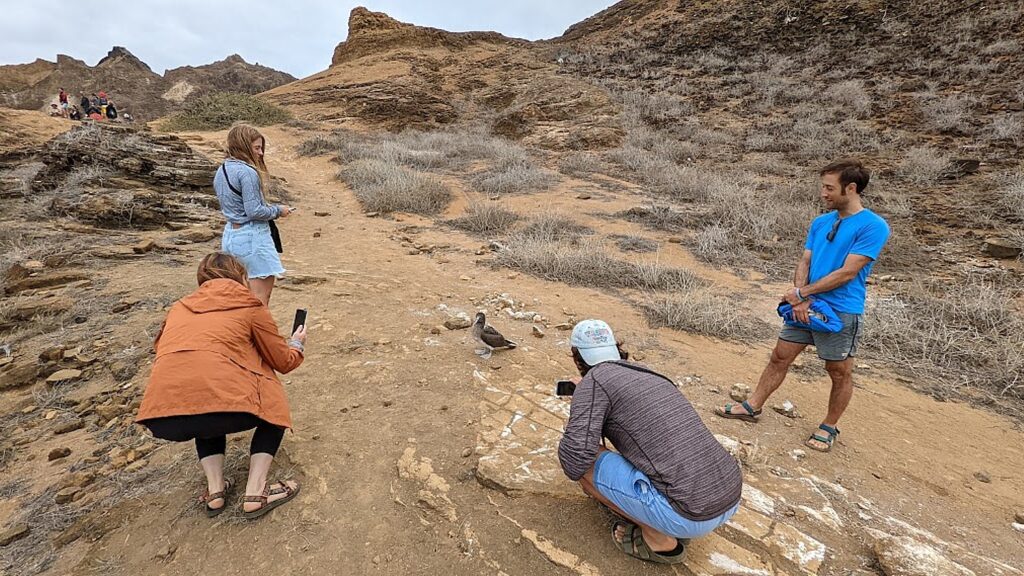
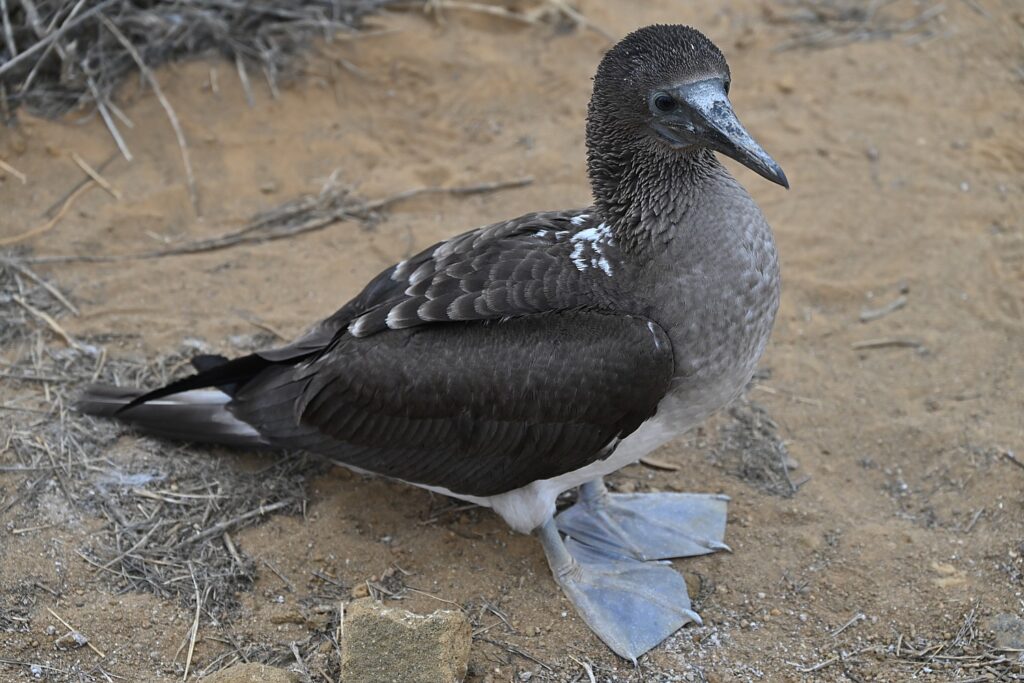
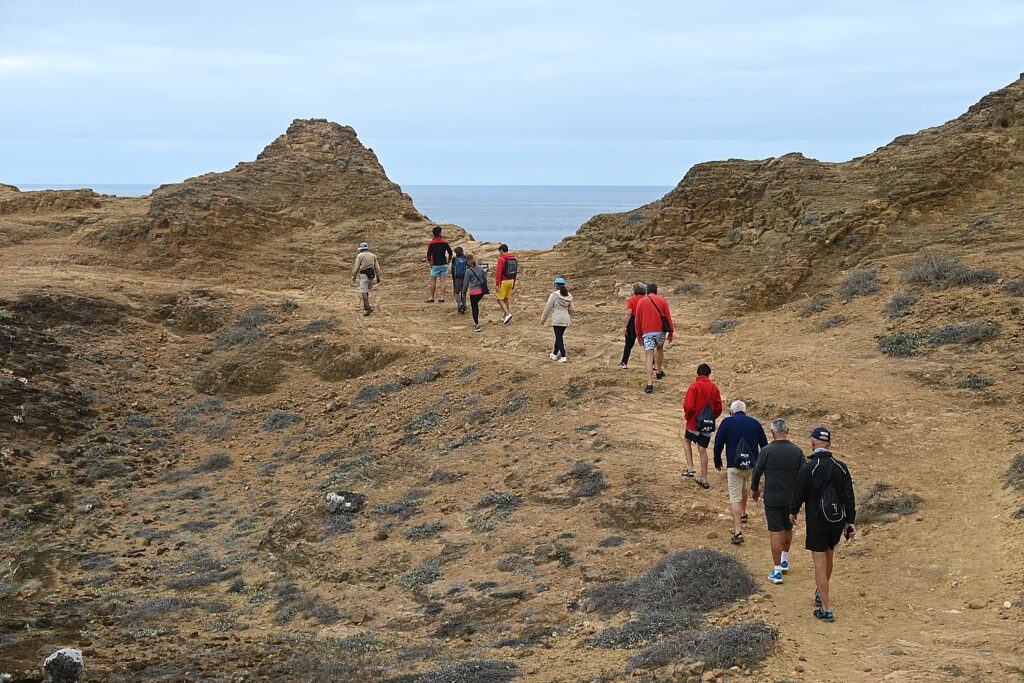
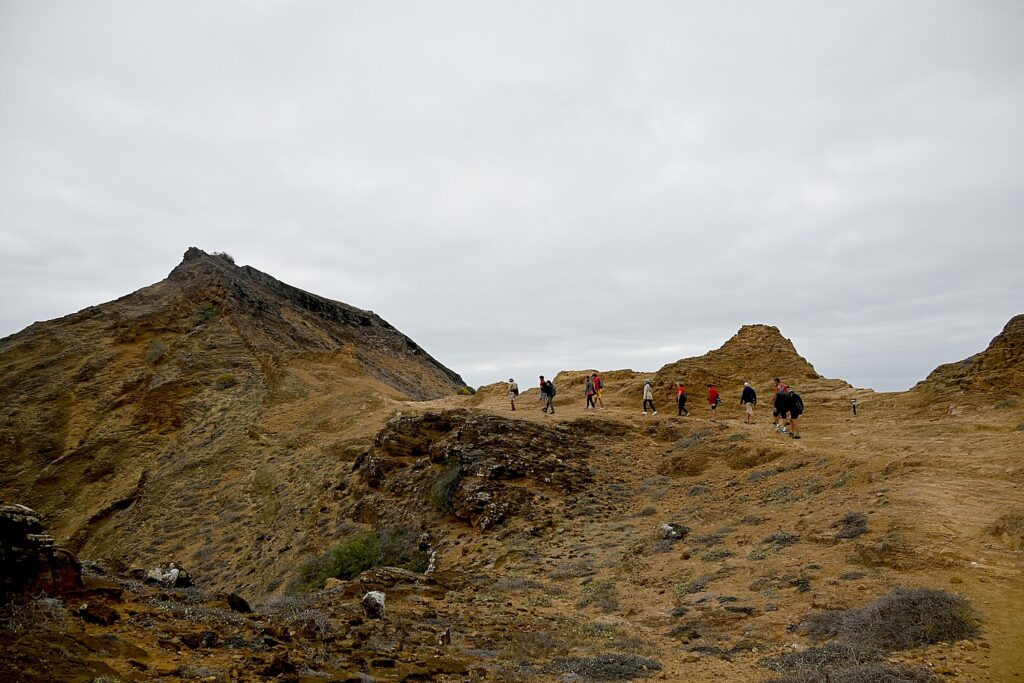
While the blue-footed booby lays up to three eggs and can get enough fish to feed two to three chicks, the red-footed booby only lays one egg, because it takes half day to fish so it can only feed one chick. It nests in large colonies, laying one chalky blue egg in a stick nest, which is incubated by both adults for 44–46 days. The nest is usually in a tree or bush and only rarely on the ground. It may be three months before the young first fly and five months before they make extensive flights. Red-footed booby pairs may remain together over several seasons. They perform elaborate greeting rituals, including harsh squawks and the male’s display of his blue throat, also including short dances. (See: https://www.santacruzgalapagoscruise.com/boobies-in-the-galapagos/)
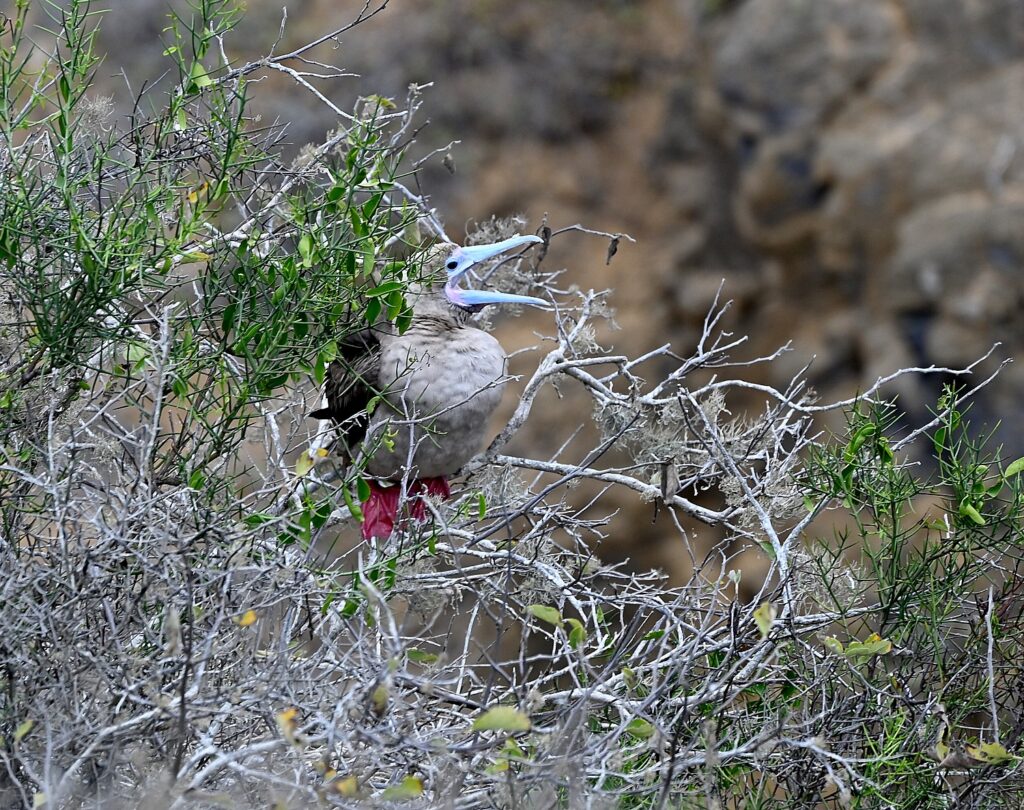
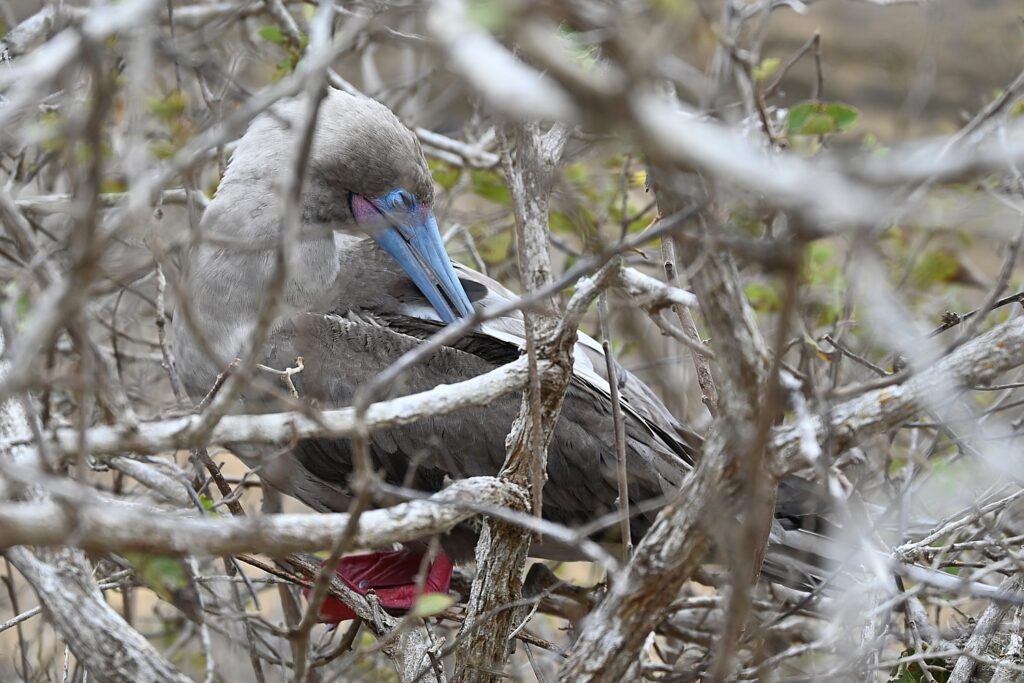
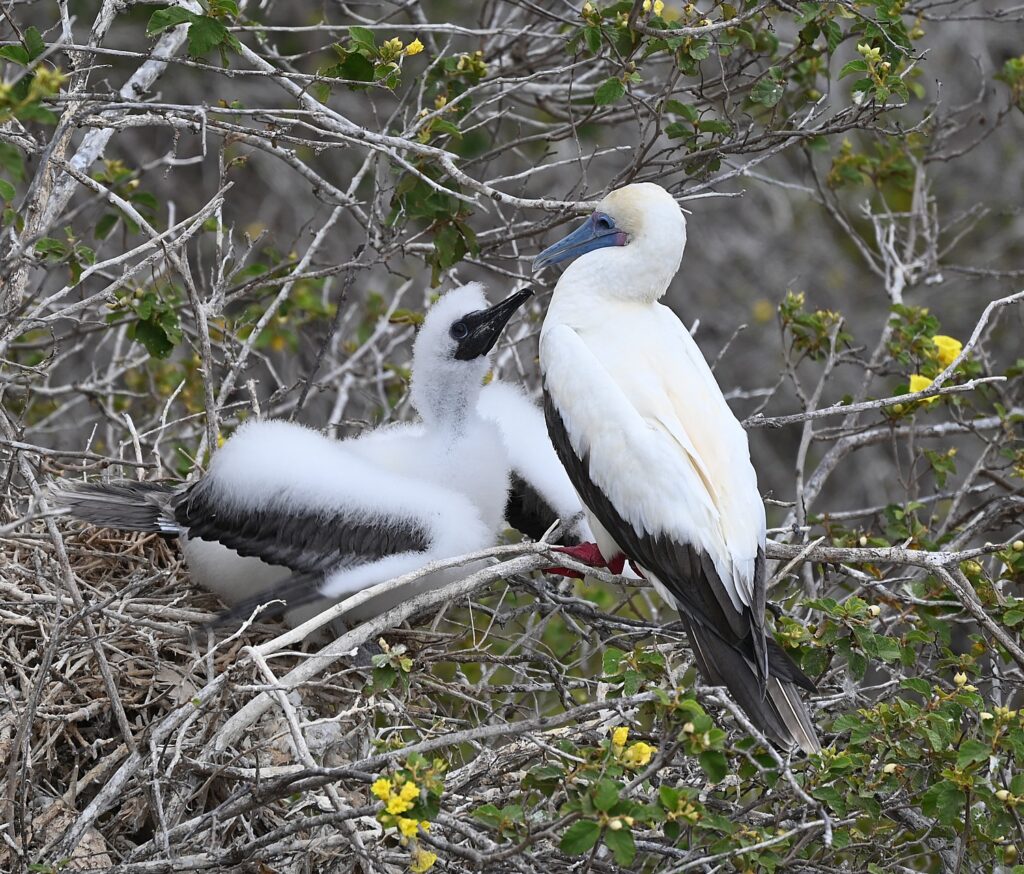
At the high-point in the walk, there is a stunning view and the most vivid color. And for sure, Karen spots a red-footed booby flying back with a branch and watches as it maneuvers the branch to make a nest. We soon come upon another nest where the parent is feeding her chick.
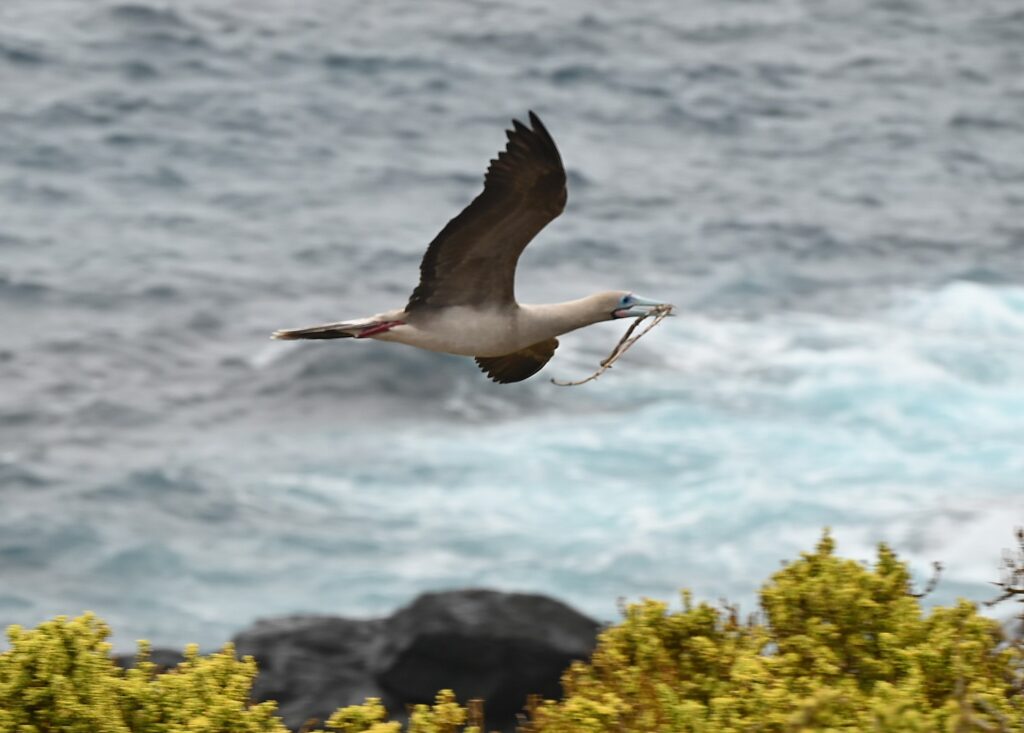
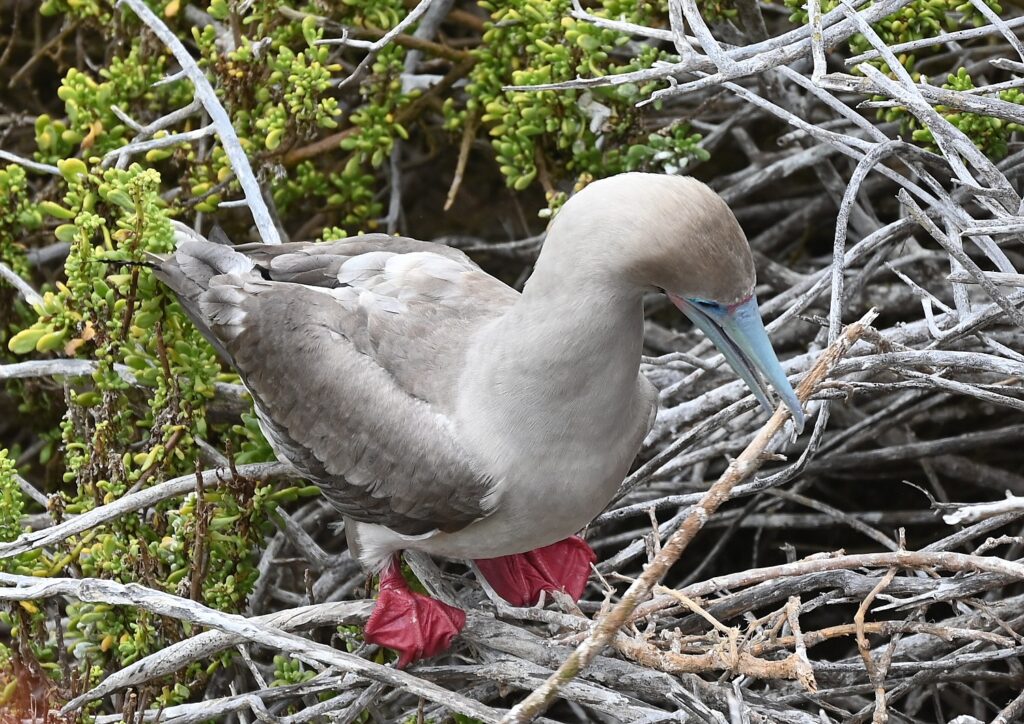
We see a marine iguana nest. Our guide, naturalist Billy, says it’s a mystery why it lays its eggs so far from the ocean, and how the hatchling, without any parental help (because the parents don’t stick around), knows instinctively how to get to the ocean. He suggests the baby iguana can feel the vibration of the ocean waves; Karen has the hunch that the baby can smell the salt since we have learned that land iguana have glands which remove the salt from their blood and, as we have seen, expel the collected salt in forceful nose excretions which look like snorting or sneezing. (Karen says, “Hey, we’ve been in the Galapagos like five days, I have my two cents!)
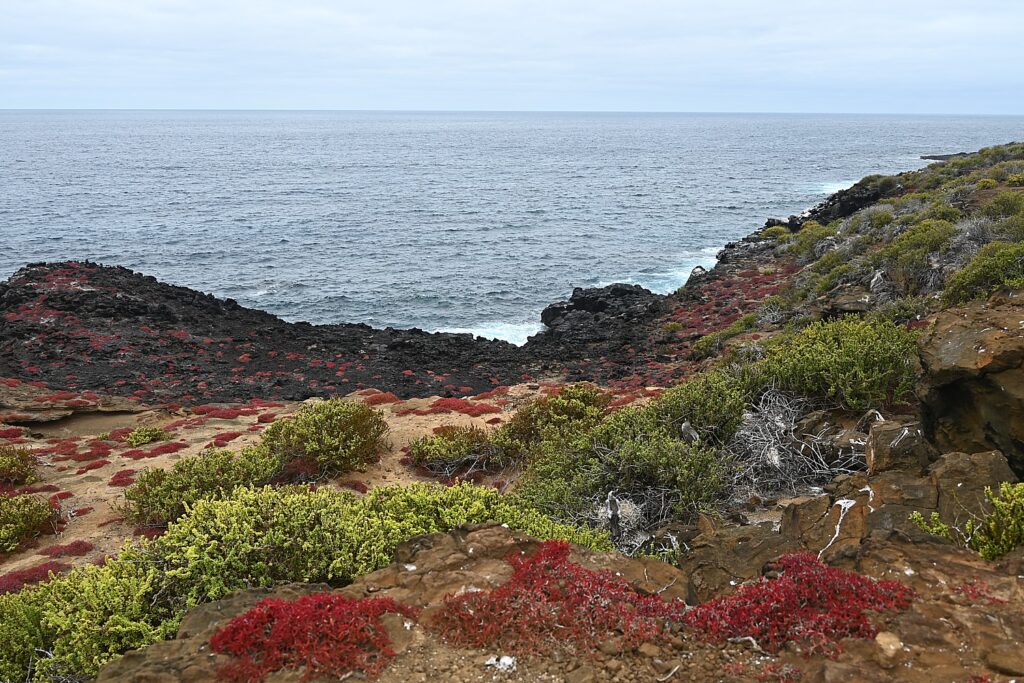
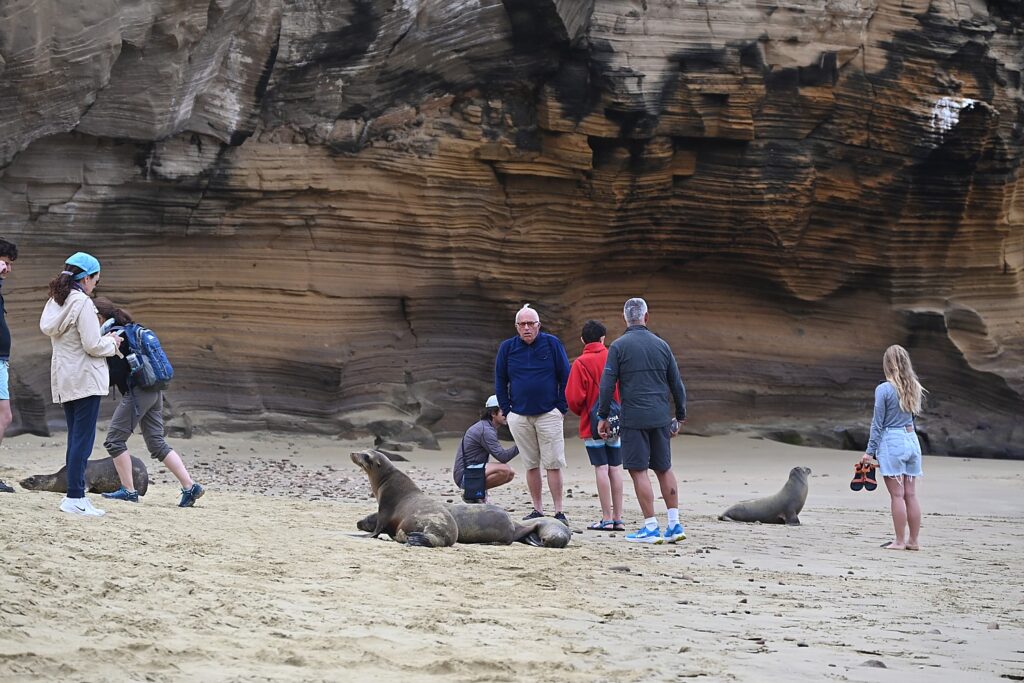
Coming back down to the beach, we get to snorkel again, and this proves to be the most sensational experience of all – the sea lions actually play with us in the water. One uses a rock like a ball, tossing it up and grabbing it in its mouth, and when it drops into the sand, digs it out with its snout and plays some more. Sarah finds a sea turtle that we get to swim with.
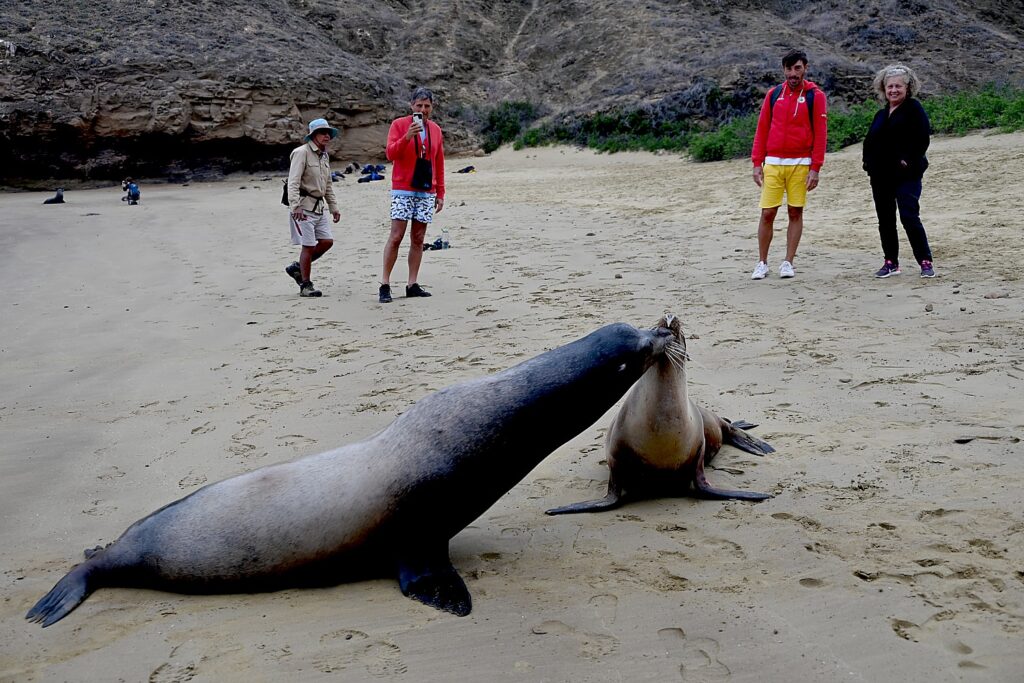
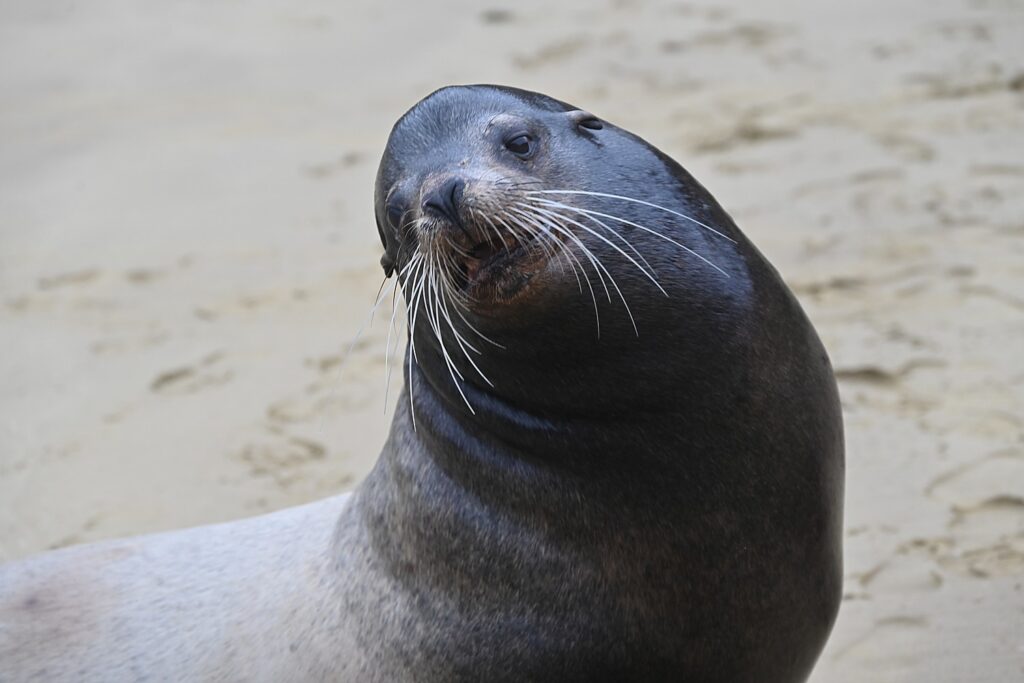
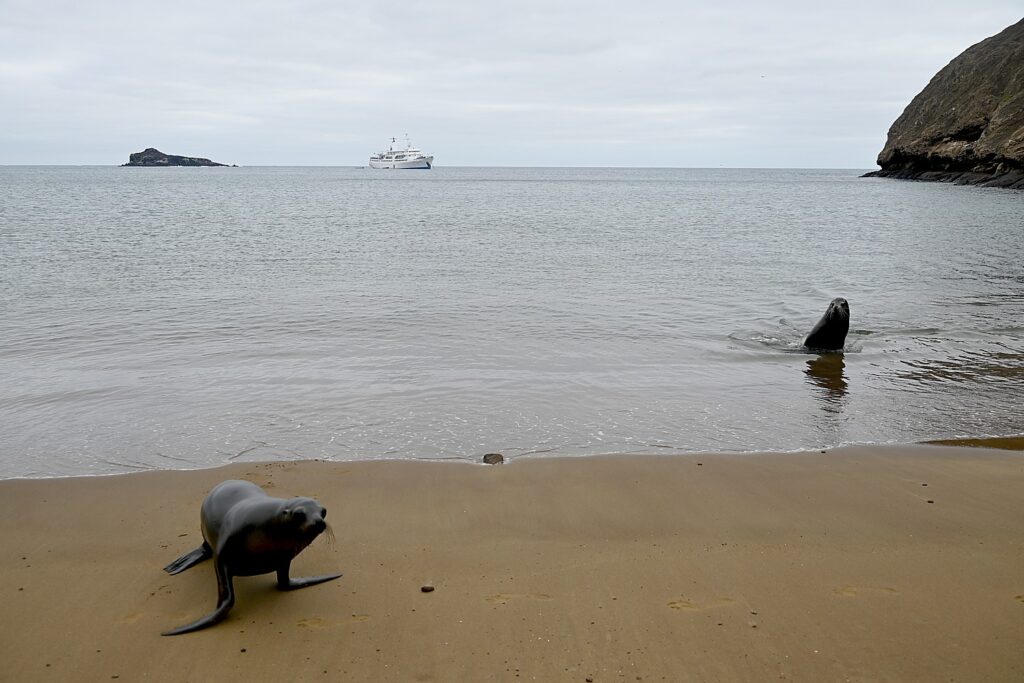
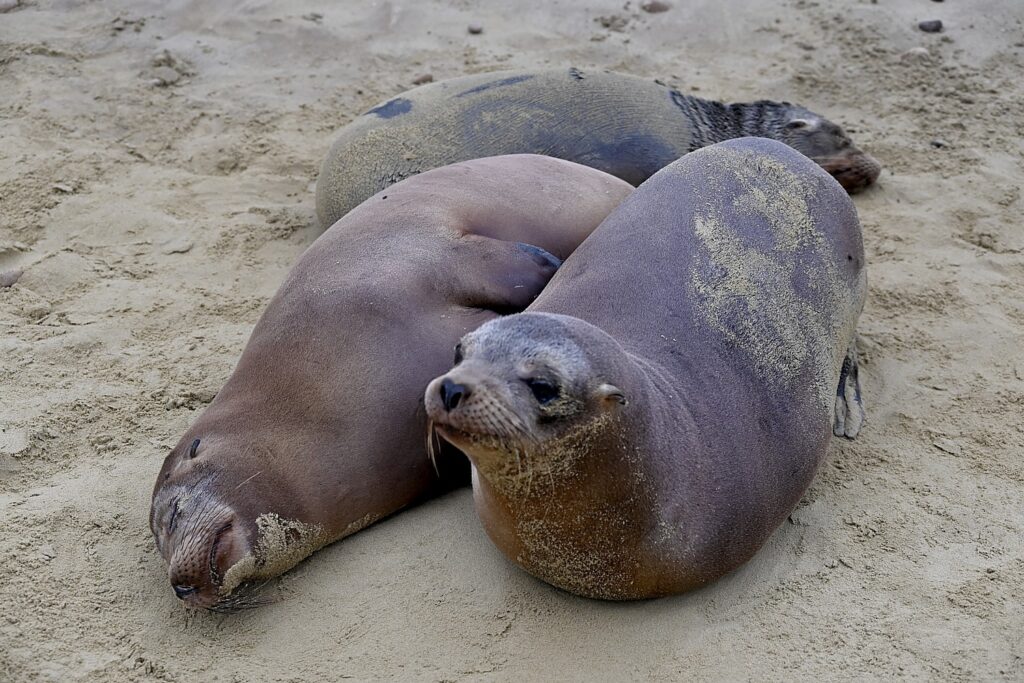
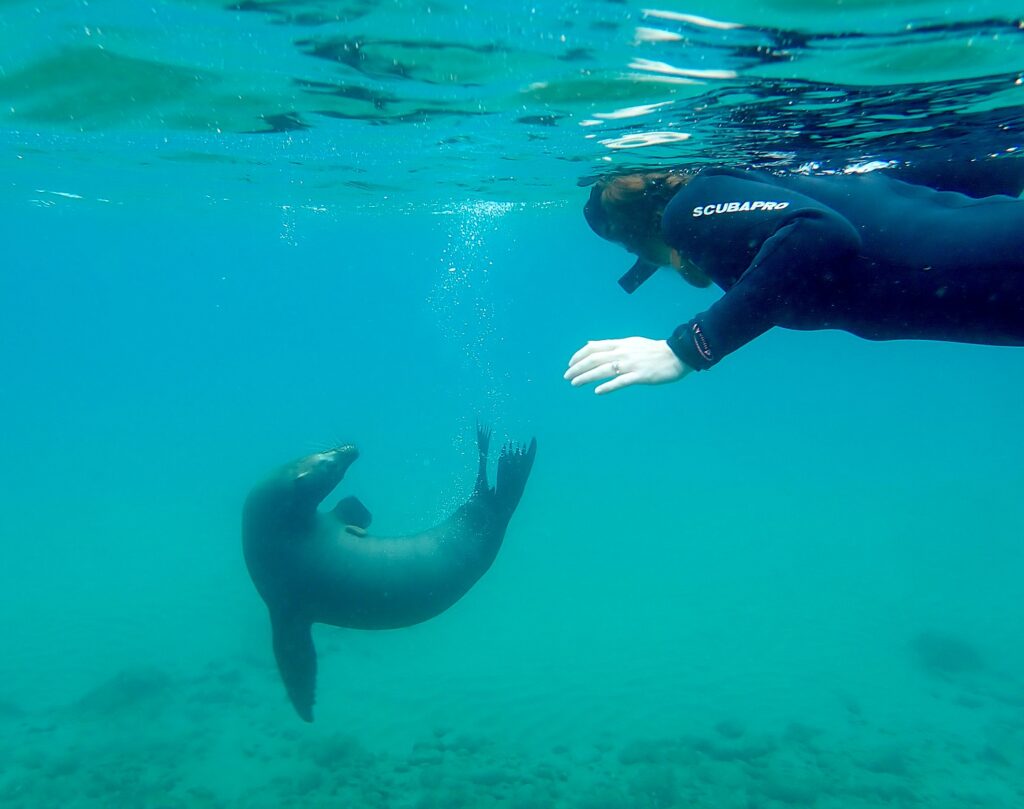
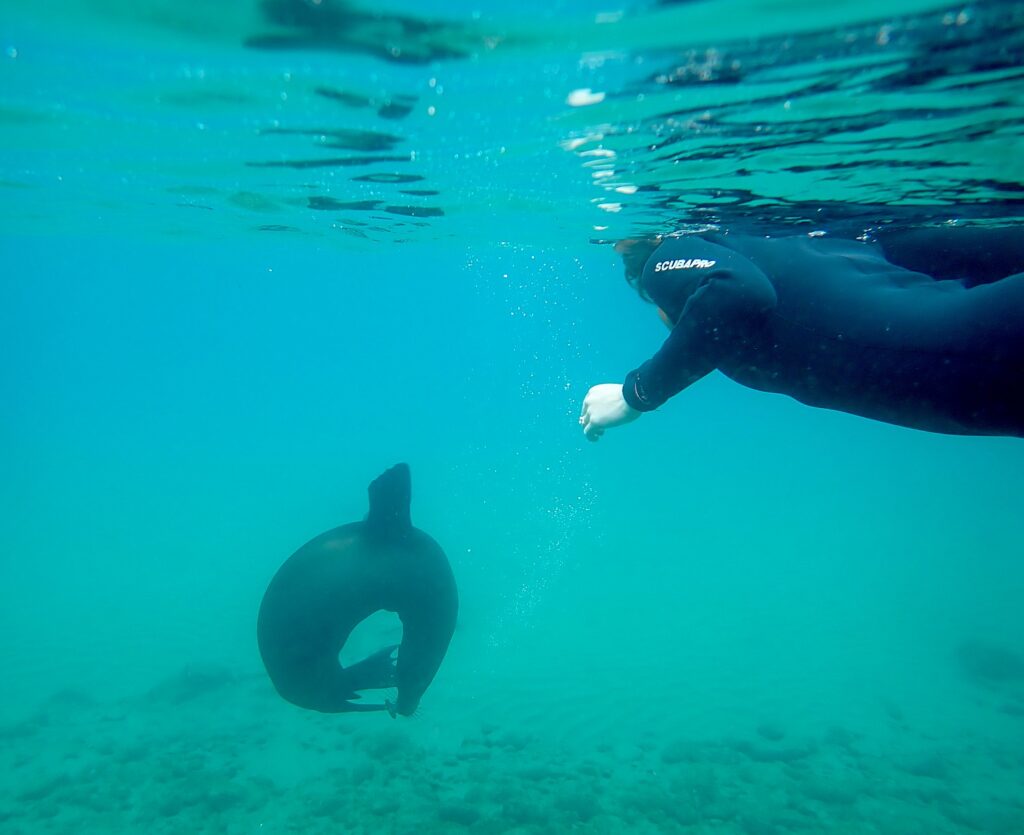
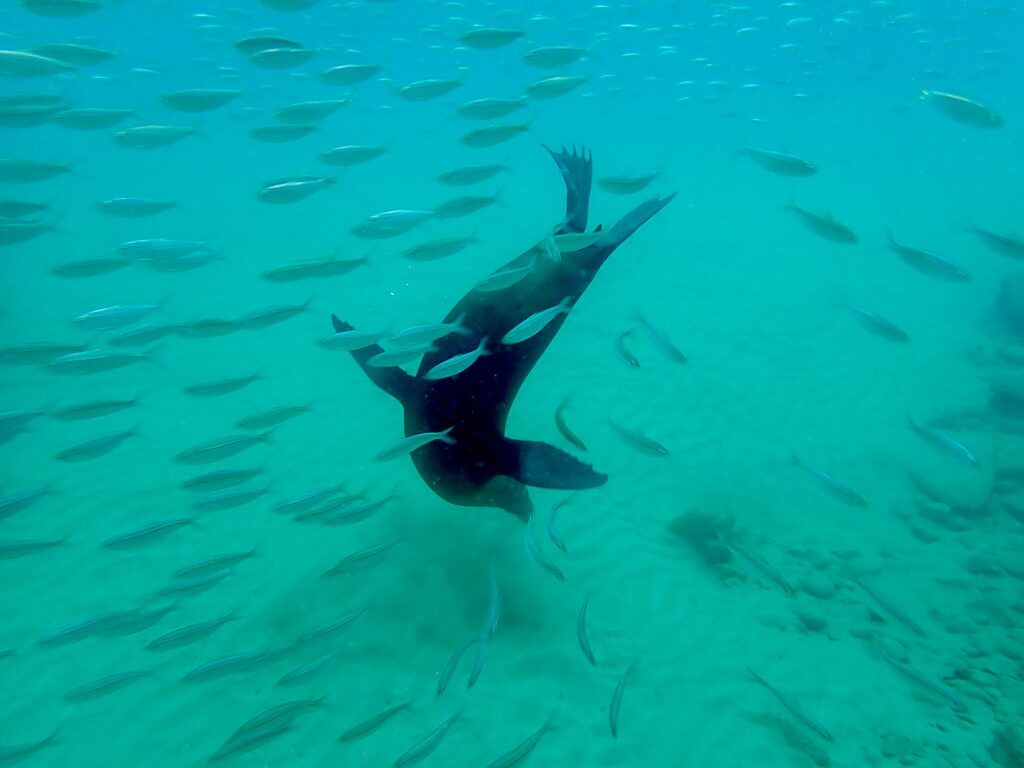
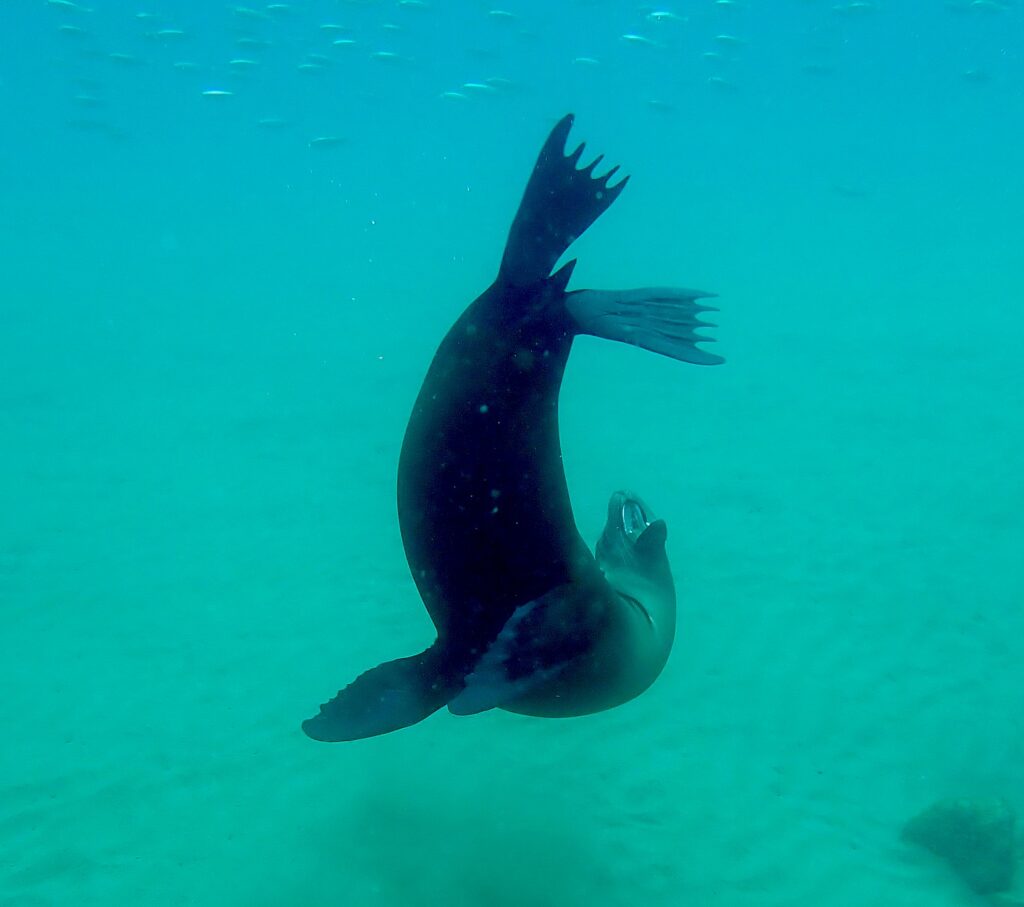
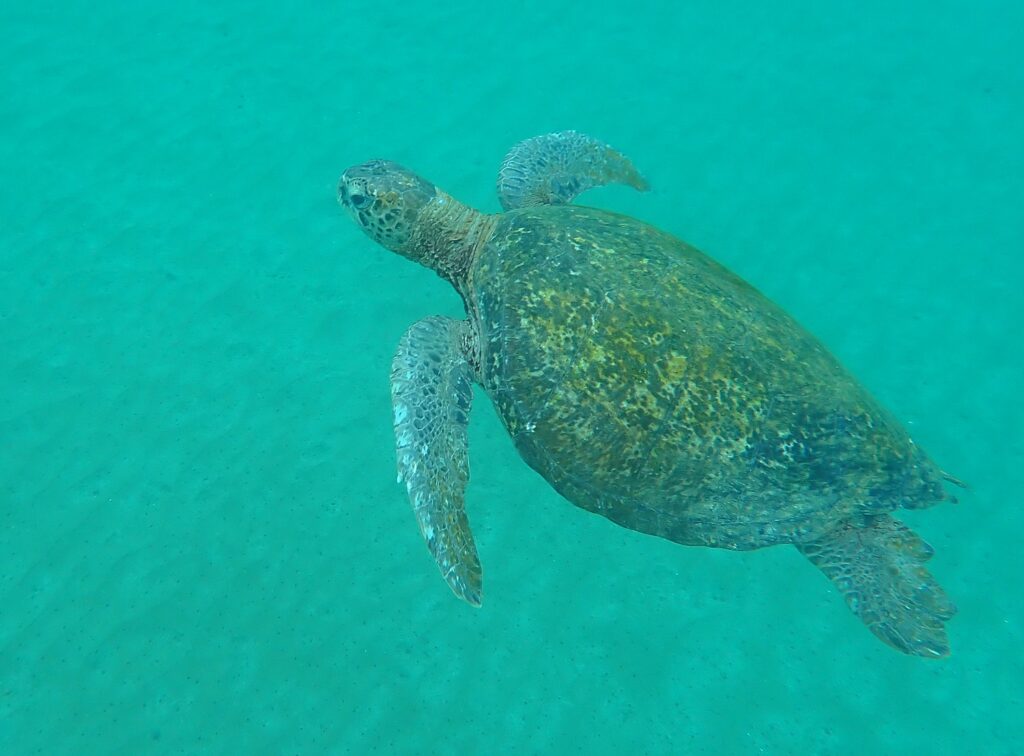
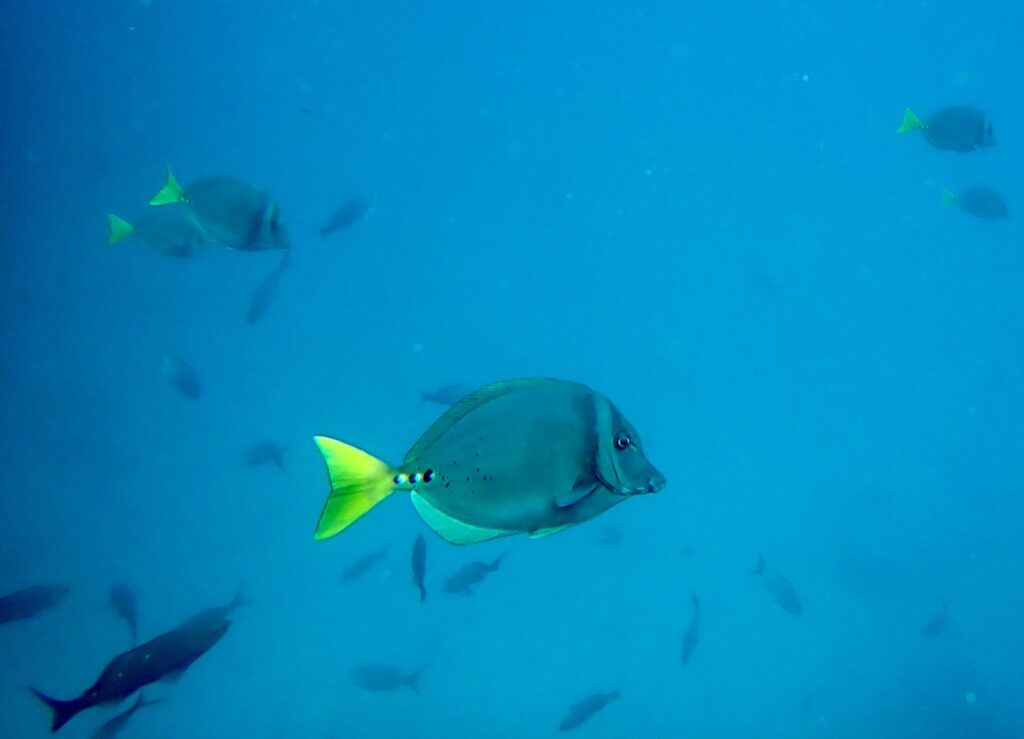
In the afternoon, we sail to a different part of San Cristobal, Cerro Brujo, where there is an exquisite white-sand beach just loaded with sea lions. Our visit begins with a dinghy ride to explore the gorgeous rock formations and see the iconic scene of Kicker Rock through an opening.
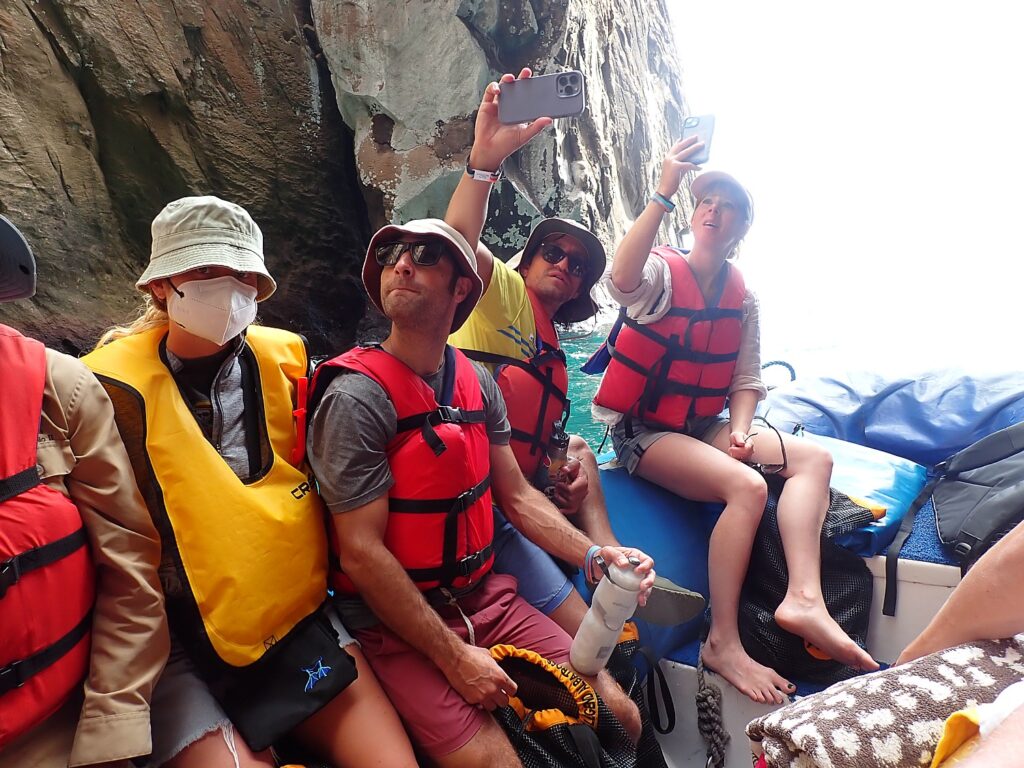
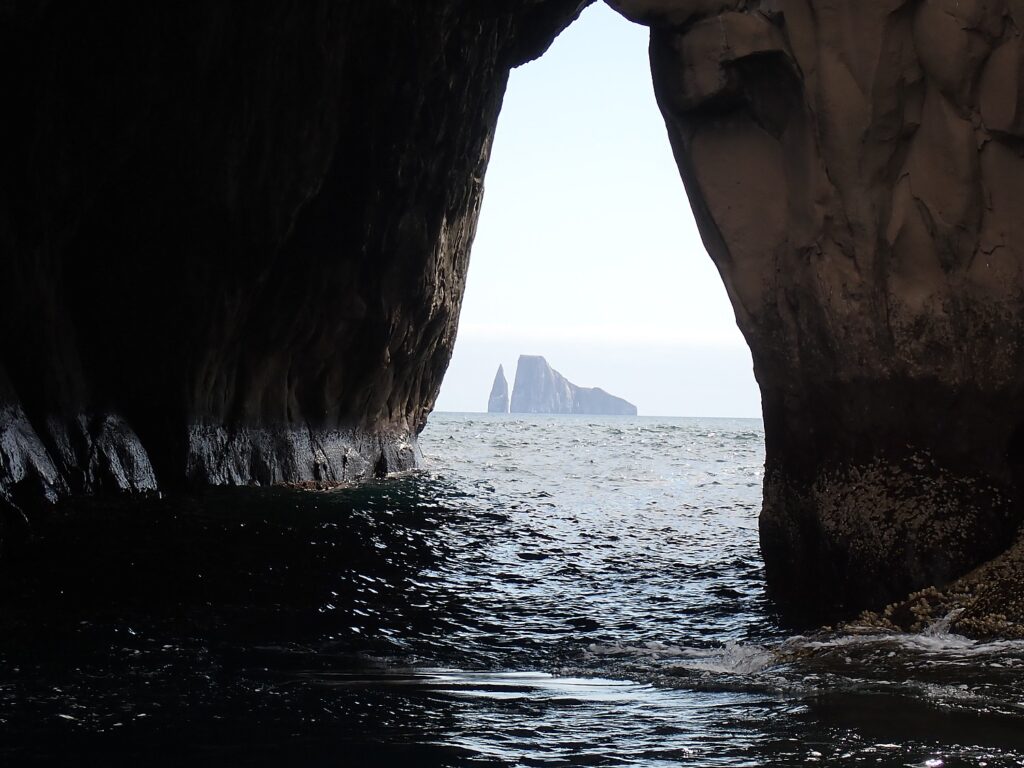
We spend a relaxed afternoon on Cerro Brujo, which was one of the first sites visited by Darwin. The coral sand beach is so beautiful, we spend only a little time swimming or snorkeling because just walking (or jogging) along the beach is so special. The scenery is dramatic – the white sand, black lava, aquamarine water, the sweep of the horizon, the iconic Kicker Rock framed on the horizon, and the Galapagos Legend anchored.
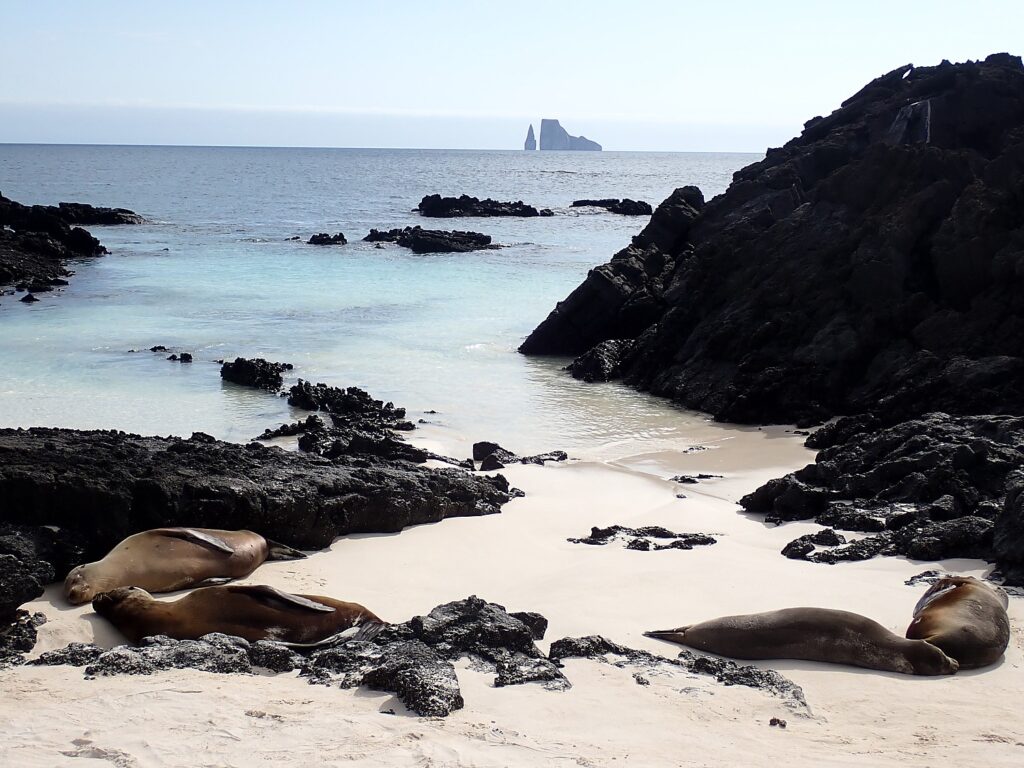
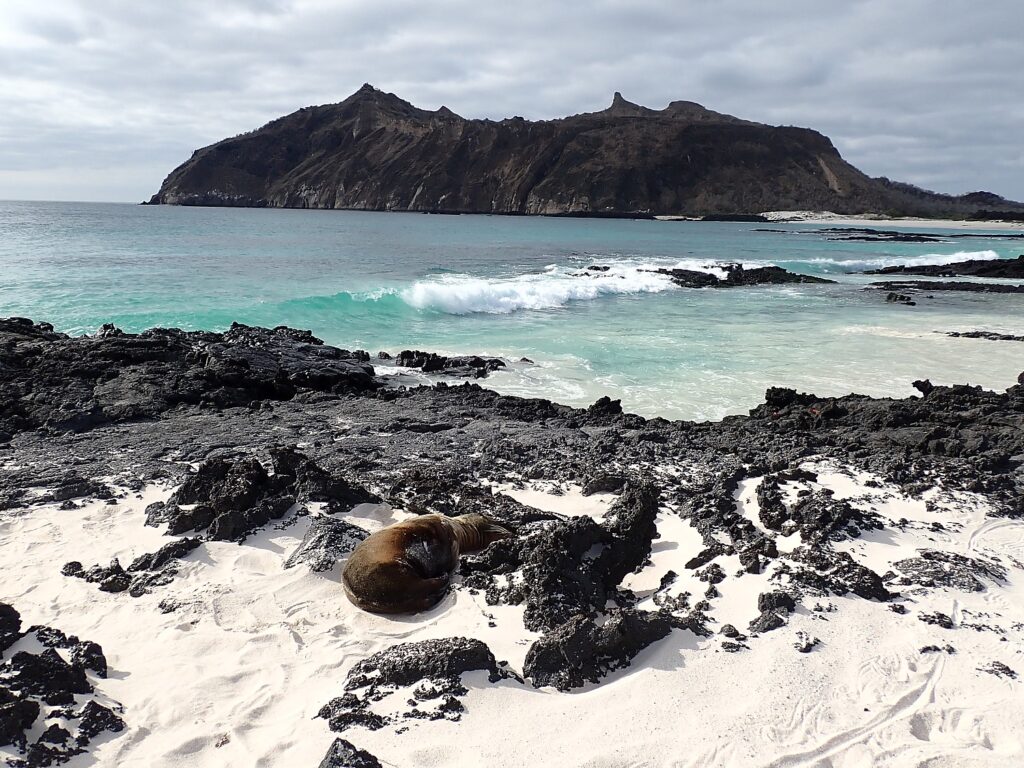
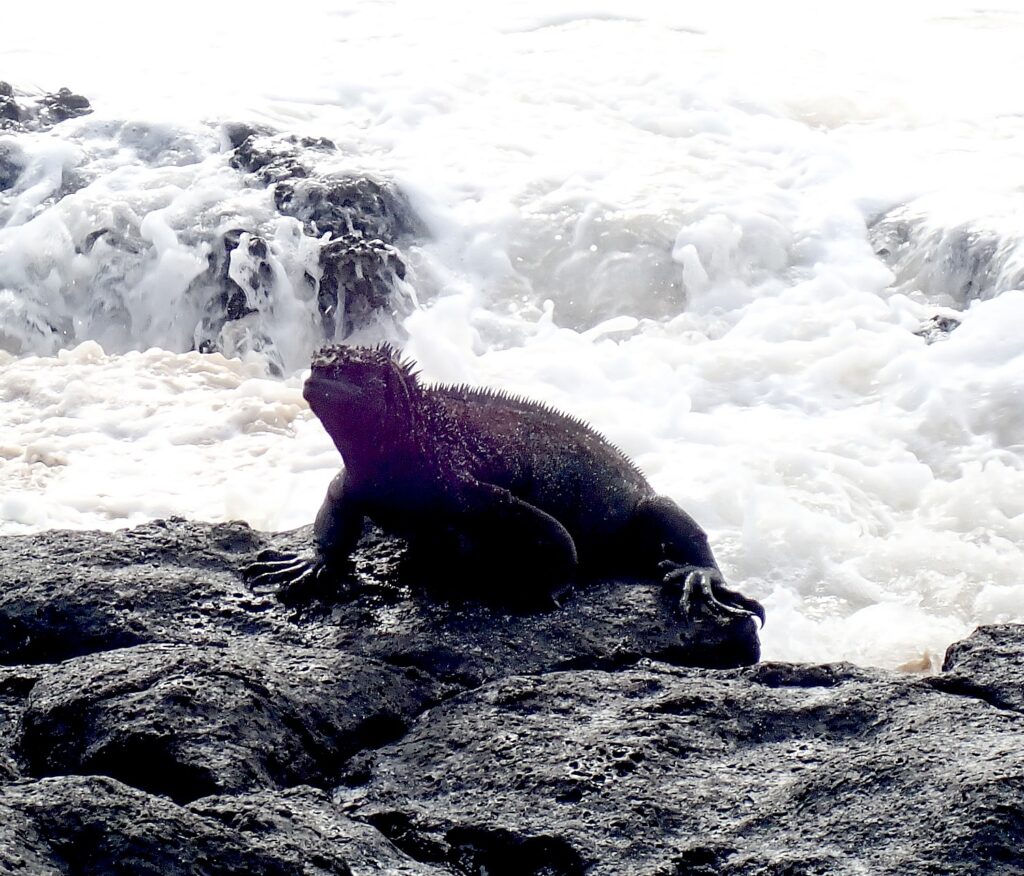
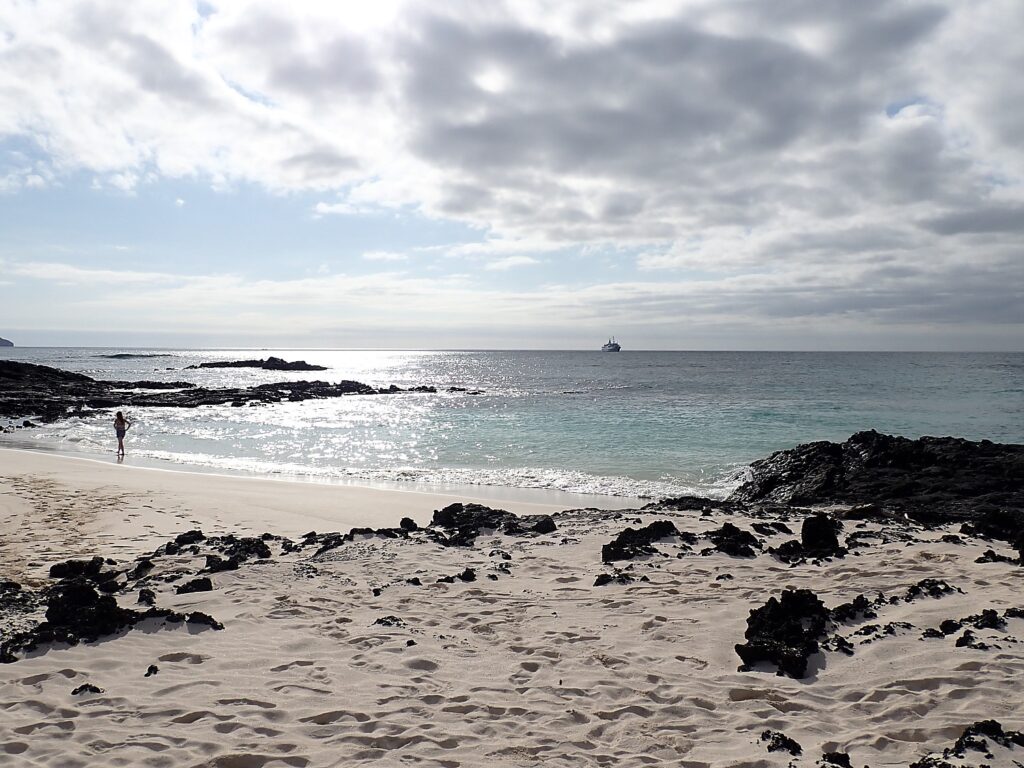
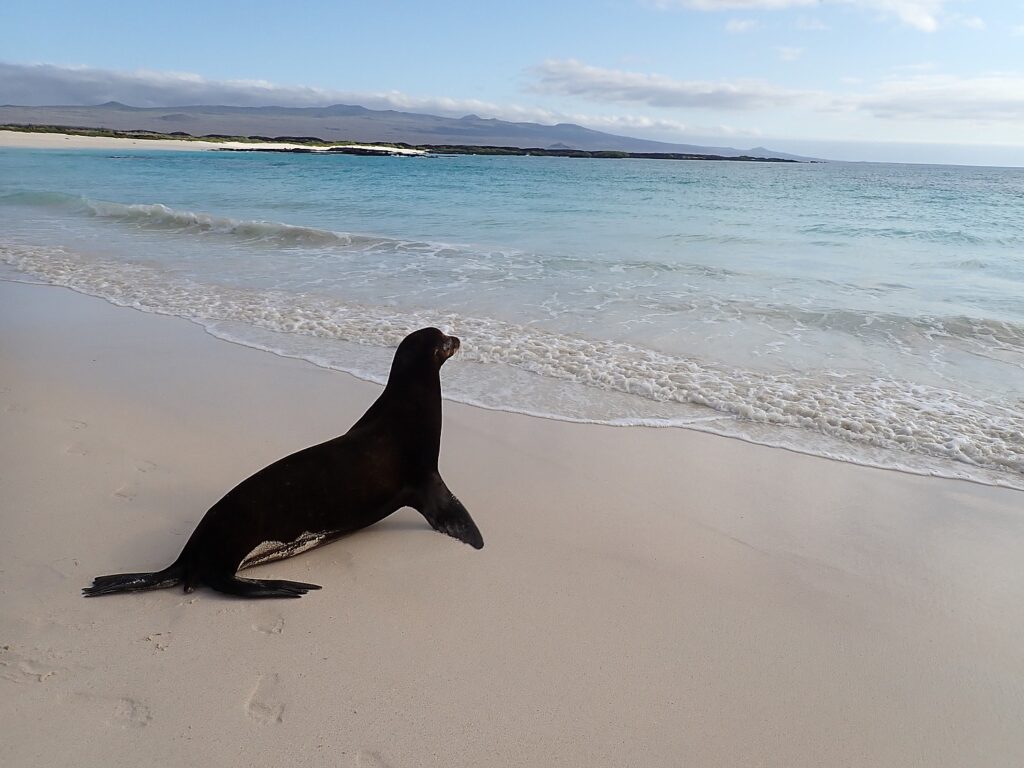
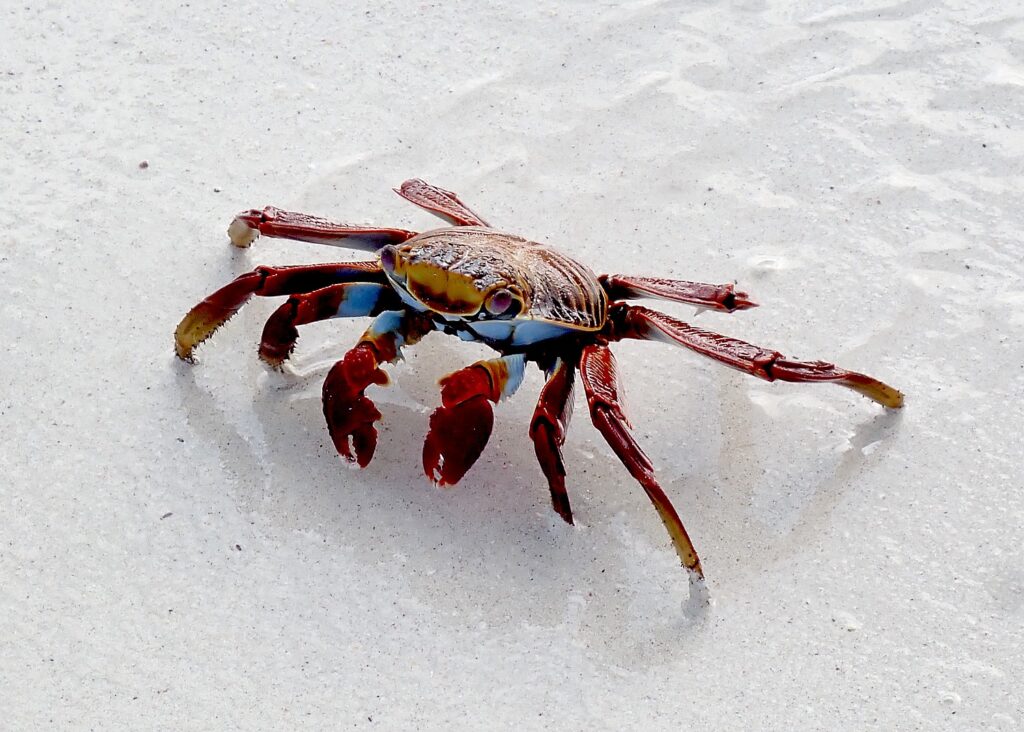
There are black iguana, black crabs and bright-red crabs climbing the black lava rocks, some of us spot the last baby sea turtle trot from its nest into the ocean, and we get to watch a mother sea turtle making her way back into the sea. Walking to the far end of the lagoon to Sapho Bay (Puerto Grande), we look out for black-necked stilts, ruddy turnstones, whimbrels and white-cheeked pintails. And apparently, there are legends of buried treasure at Puerto Grande.
Laini sketches the sea lions from a distance of a few feet; Sarah is transfixed by a mother sea lion and pup, David and Eric run to the end of the lagoon.
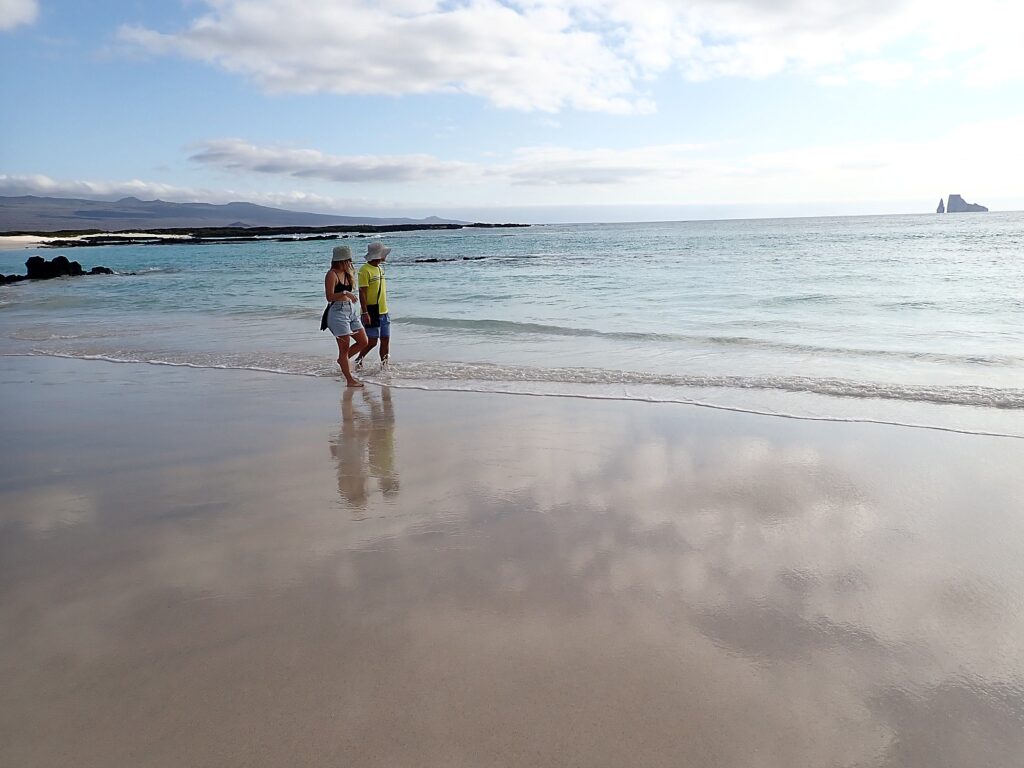
It is a feeling of complete contentment that continues on during an Ice Cream Festival on board the Galapagos Legend, while sitting in the hot tub, and looking back as Kicker Rock fades into the distance, glowing a golden brown in the setting sun.
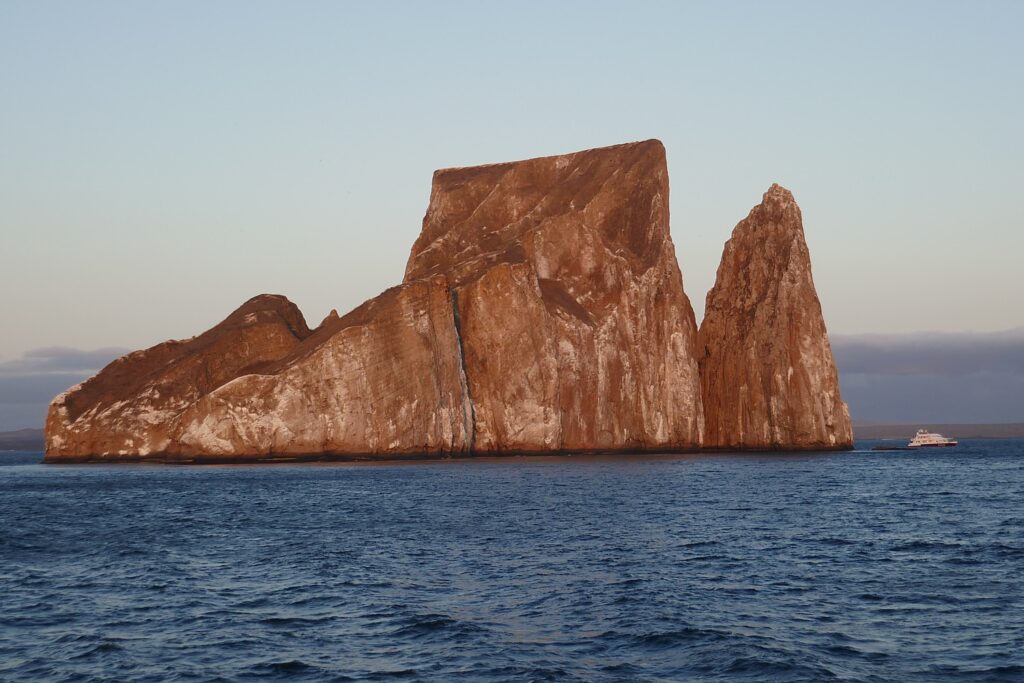
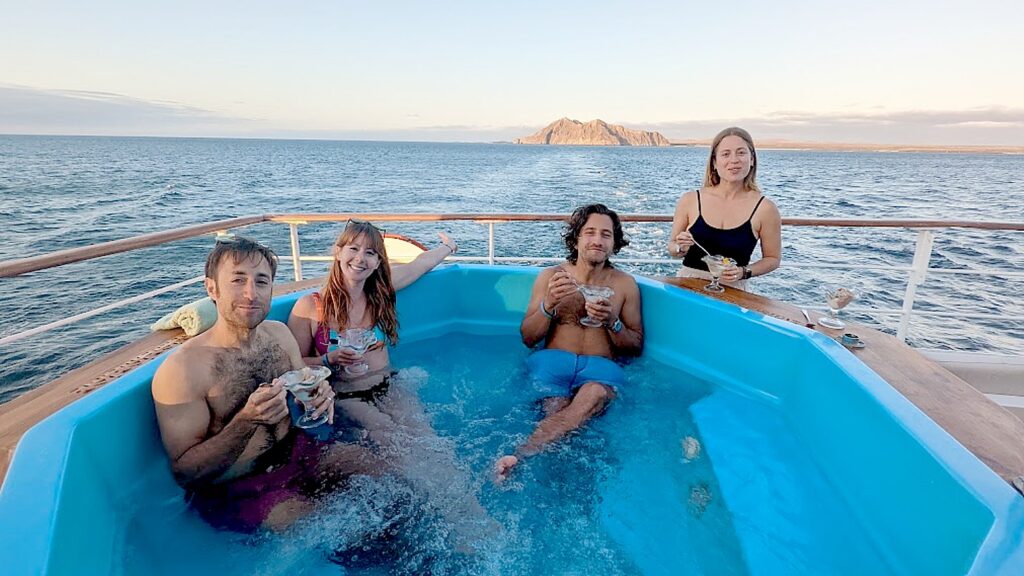
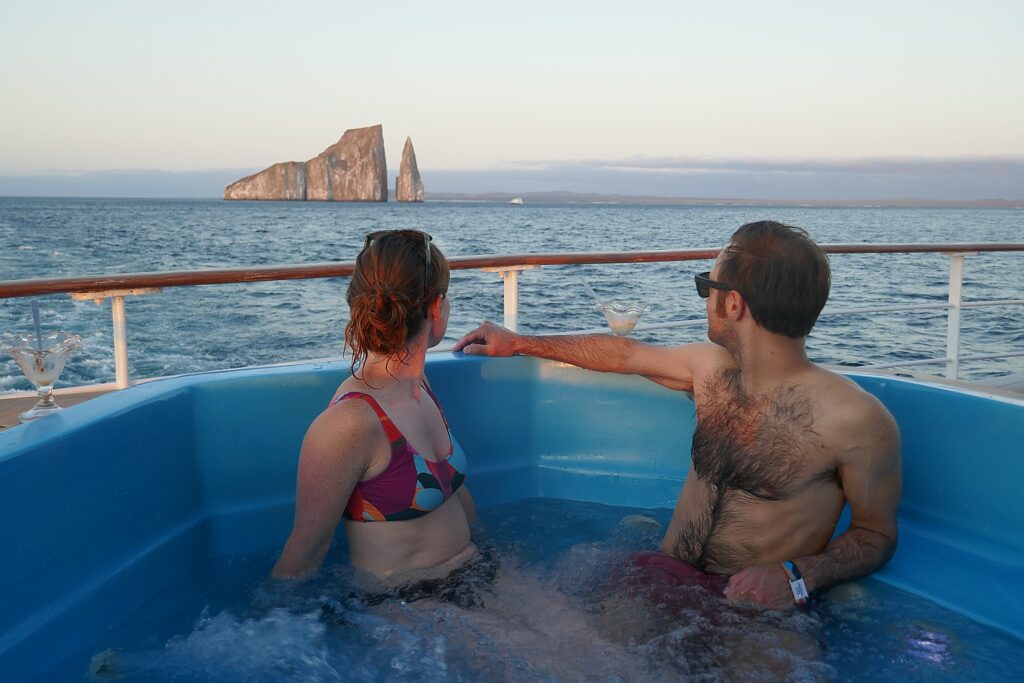
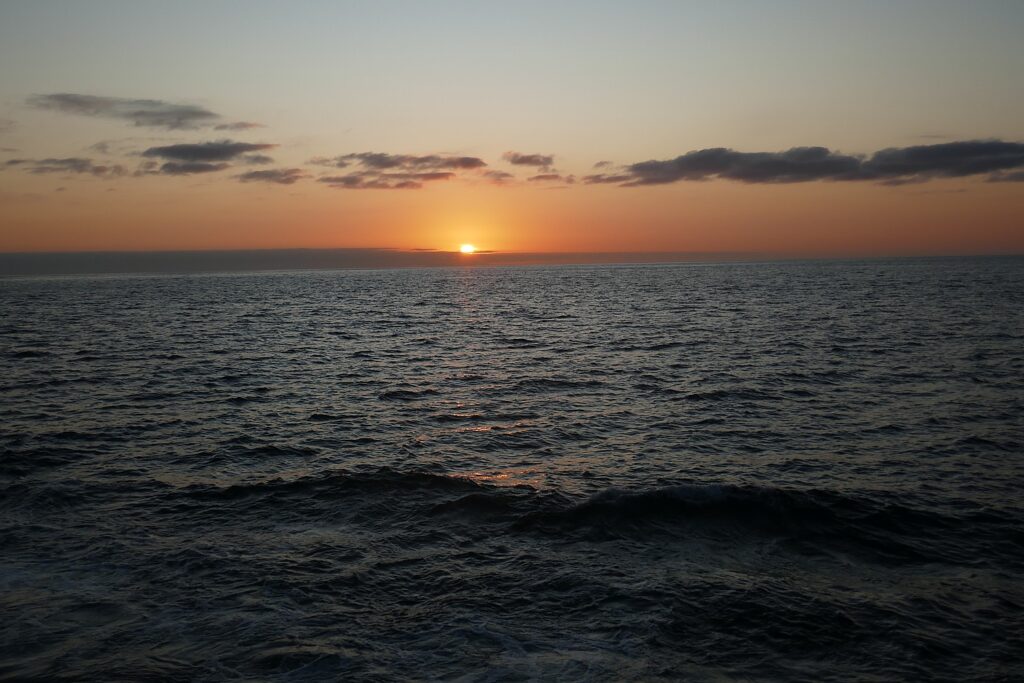
The next morning, we sail around to the Puerto Baquerizo Moreno, the main town of San Cristobal and the capital of the Galapagos province and the second most populated after Puerto Ayero on Santa Cruz.
For our final excursion, we are taken by bus up to the highlands to visit the Cerro Colorado Tortoise Reserve, a giant tortoise breeding center, established by the Galapagos National Park in 2003. We get to observe giant tortoises living in a semi-natural habitat, and learn about their origin, evolution, and threats from introduced animals. The reserve is one of four in the Galapagos dedicated to restoring the populations of tortoise, ultimately to return them to the wild.
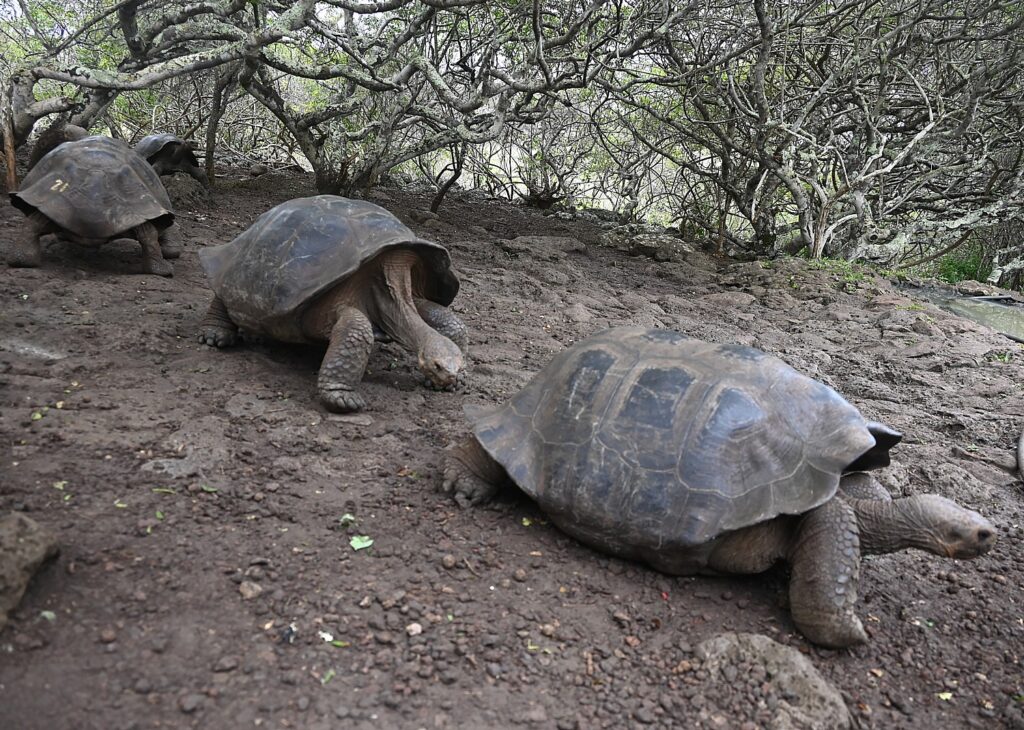
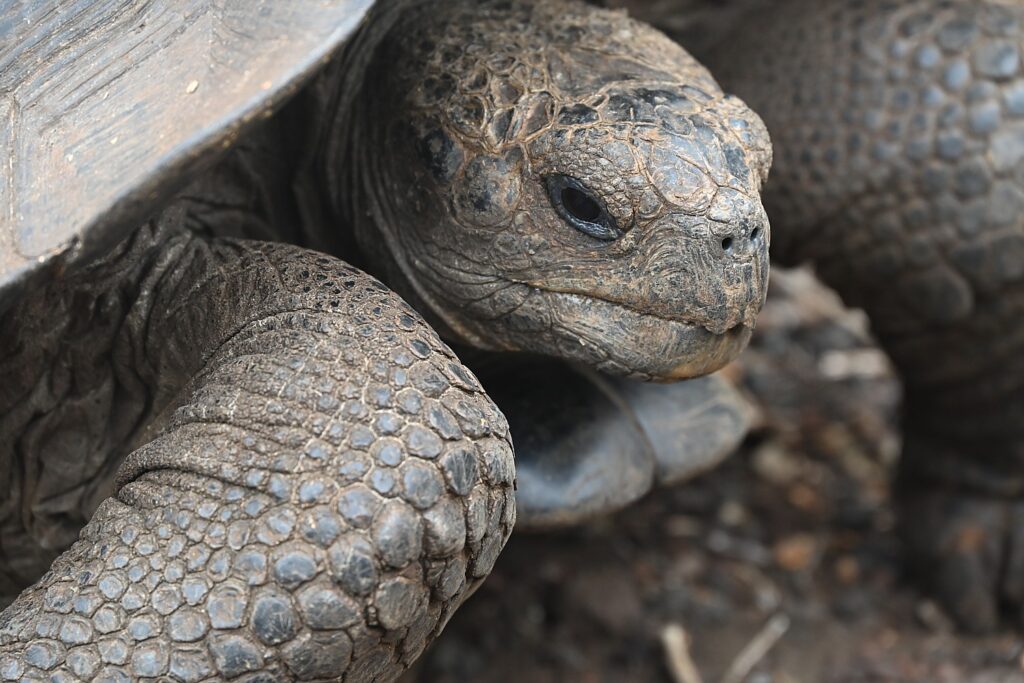
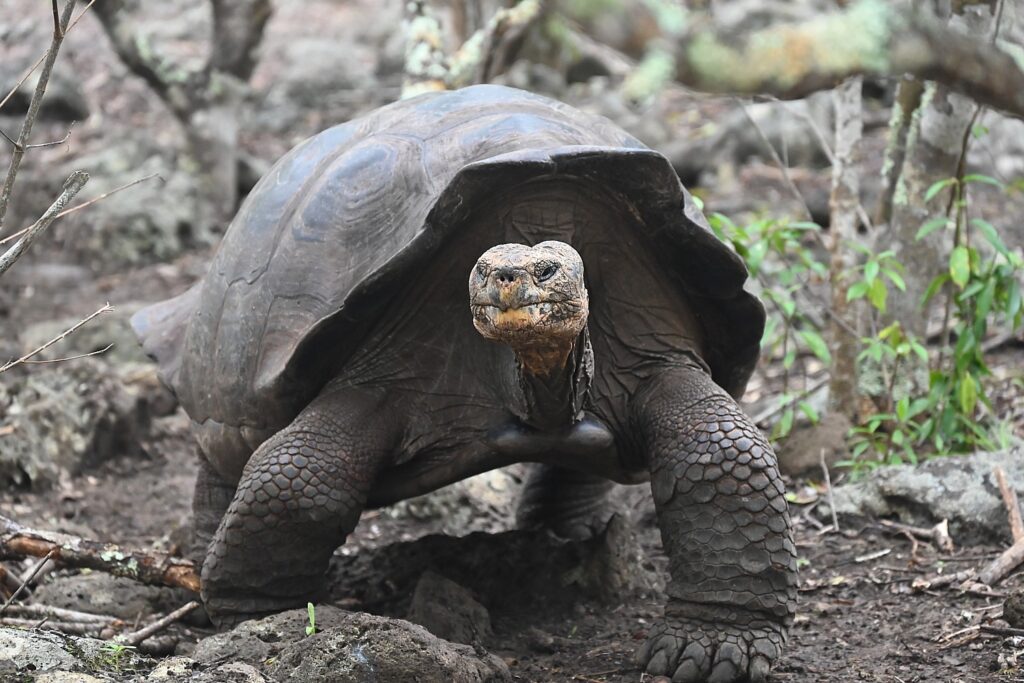
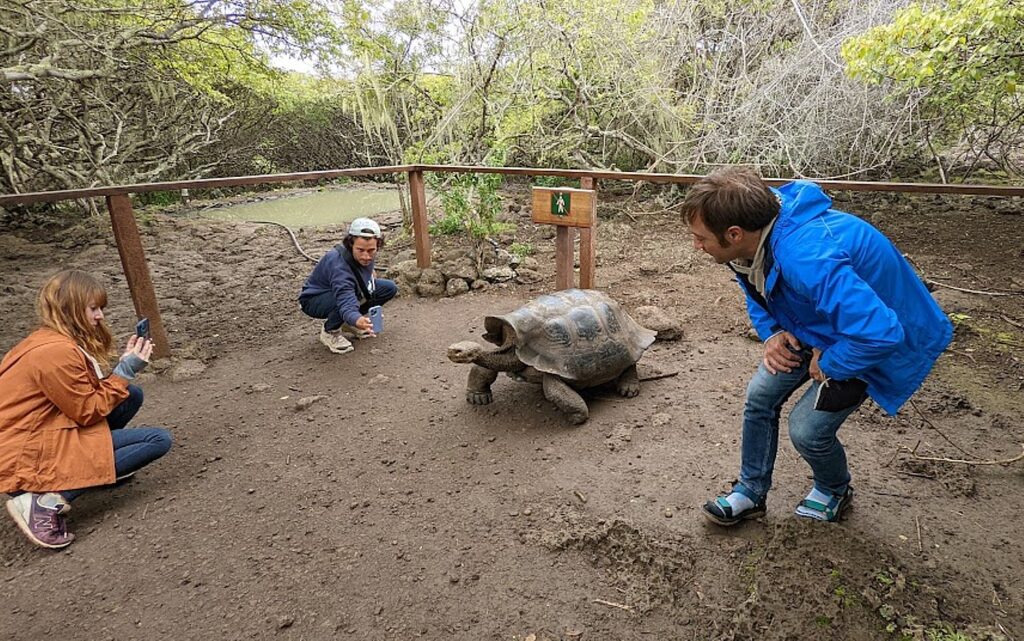
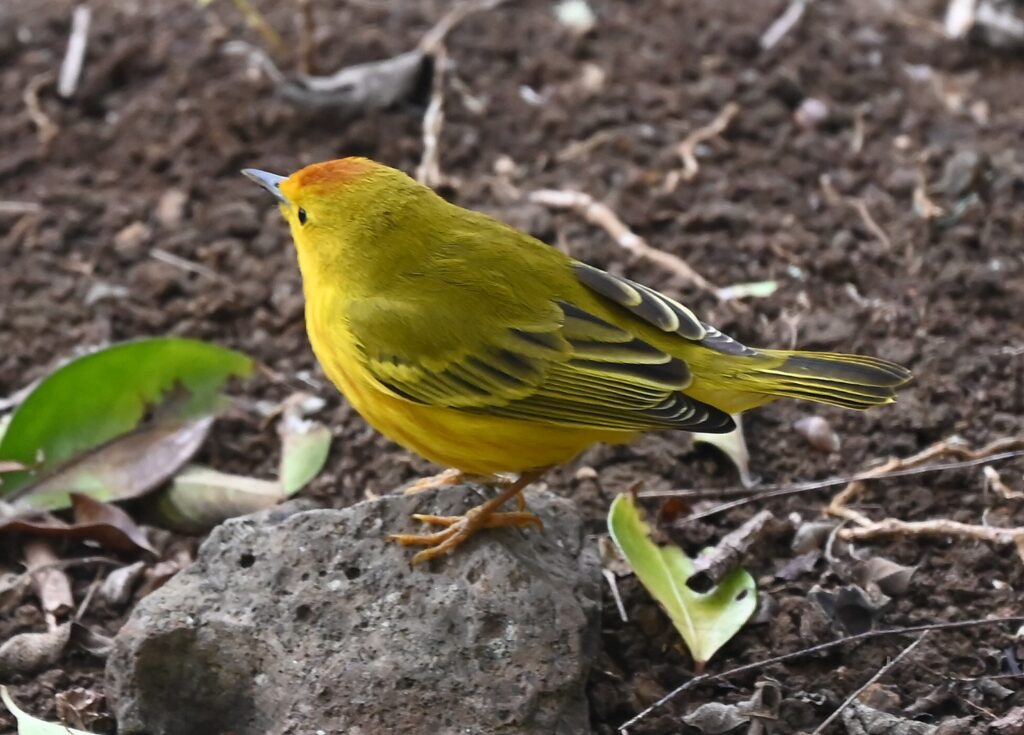
Being a port town, a provincial capital city and having an international airport, San Cristobal is also a gateway for invasive, sometimes aggressive, species – like the black fly which came in 1990 and proved dangerous for humans and farm animals.
The town is just a short walk to the airport where Eric, Sarah and Karen fly on to our next destination, Quito, en route to Cuzco, Peru, and the four-day/three-night Inca Trail hike to Machu Picchu. It will be the grand finale to Eric and Sarah’s six-month odyssey.
The Galapagos Legend cruise is perfect for this bucket-list experience – the ideal mix of soft adventure, the wonder, thrill and delight of exploring and encountering truly unique sights, all in comfort, and sharing together.
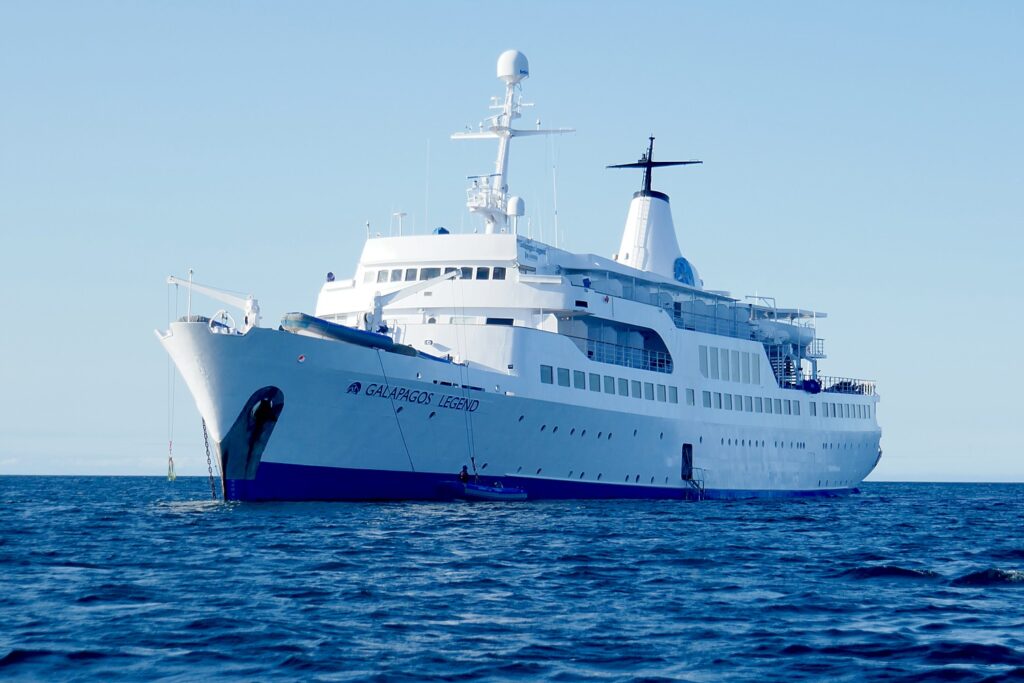
Go Galapagos offers a selection of itineraries that basically cover the major islands – four 4 day/3 night itineraries (East, South, North, West) which can be combined to make longer itineraries.
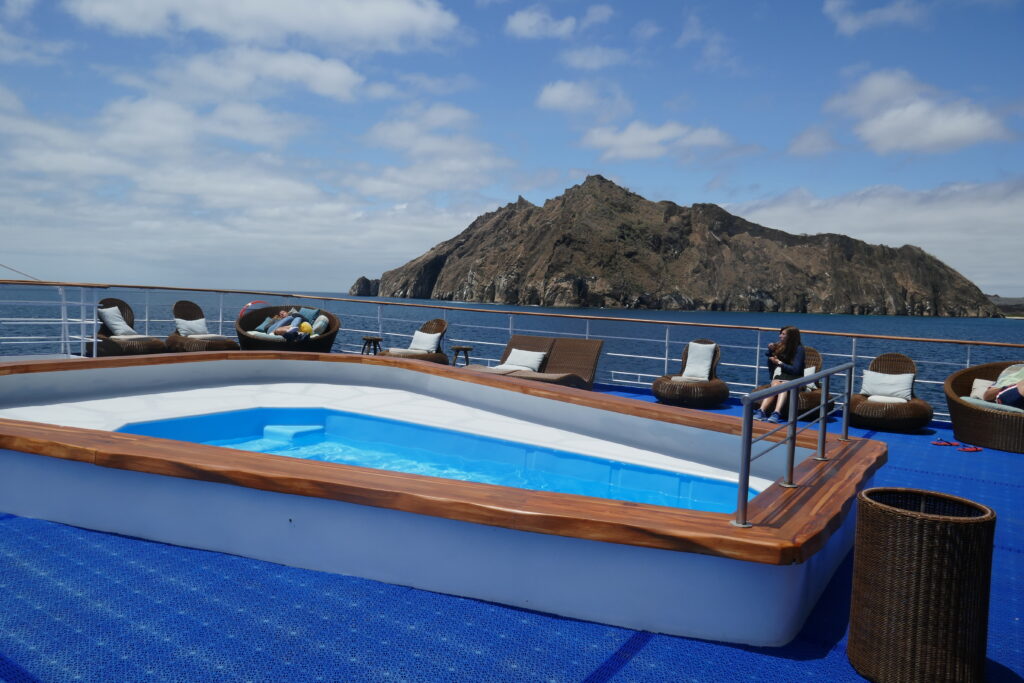
The itineraries are wonderfully organized so that your days are filled and fulfilling with exploring, hiking, snorkeling, discovering, adventuring, each place so different and distinct in terms of wildlife and geology, and then time on board to enjoy truly sensational meals either in the comfortable Lonesome George dining room, or alfresco; relax in the hot tub (how fun to have an ice cream festival while soaking in the hot tub), pool or fitness room, or hang out in the charming lounge where you are likely to see Attenborough’s “Galapagos” series running or play board games that are on hand. They also have kayaks available for rent. (Another advantage of the East itinerary is that it let us start off with a few days on Santa Cruz island and the charming town of Puerto Ayora before meeting up at Baltra Airport for the cruise.)
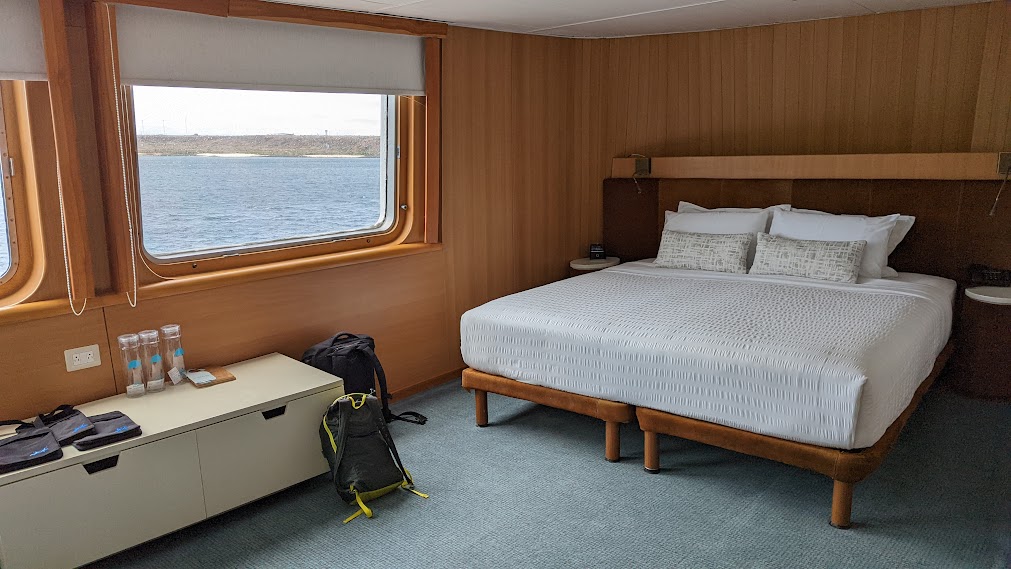
The ship, with 52 ocean-view, air-conditioned cabins is large enough to feel very comfortable and have all the amenities you would want on a luxury cruise, but small enough to feel intimate.
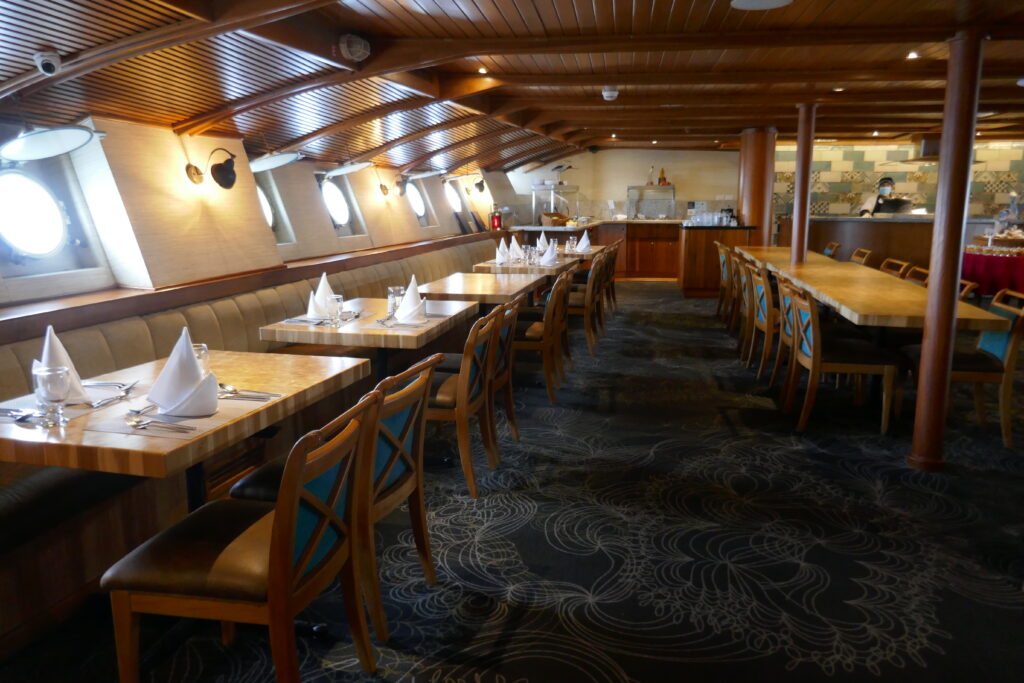
There’s a reason they say Galapagos is a trip of a lifetime – the total experience is a constant wow, especially when shared with loved ones and have the memory to share with the next generation so is ideal for a family, especially multi-generational. That’s what this is about – a chain of life and living. (But note: you need to be mobile enough to get on/off the dinghy from the boat, onto the shore, and hike, so seize the opportunity and don’t put this bucket-list trip off). The Galapagos is also an ideal honeymoon for a couple who loves adventure but wants the luxury and romance of a cruise for their special journey starting out life together.
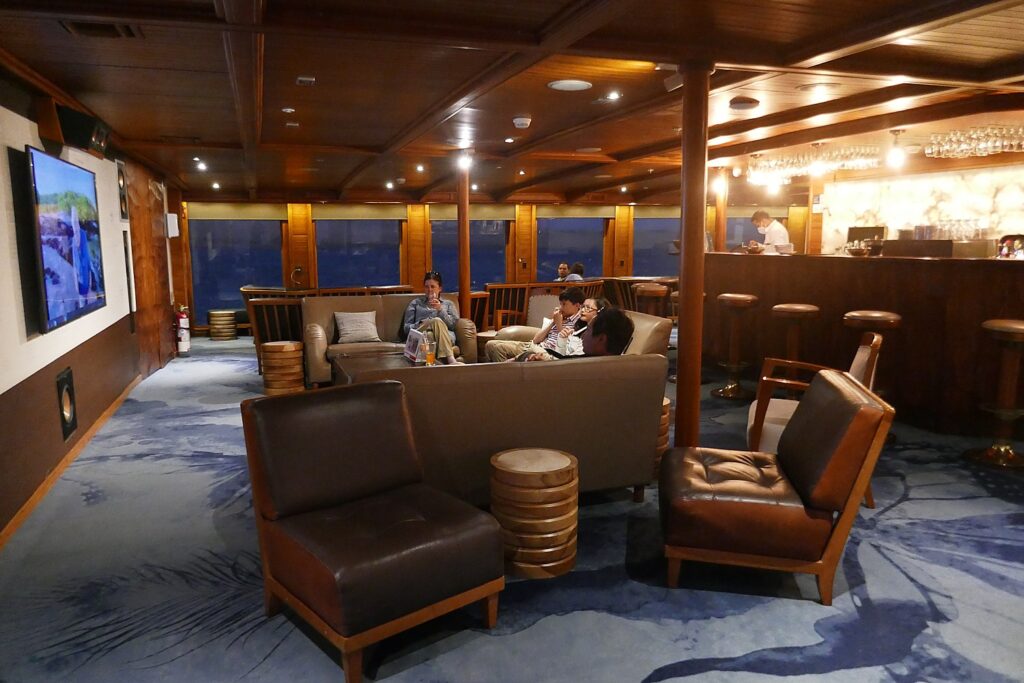
Just how special a Galapagos cruise is can be appreciated by the multiple milestone birthdays celebrated each night. (Indeed, Paul, a video game animator who was taking his third consecutive cruise aboard the Galapagos Legend, said he got tired of waiting for friends to join him, so just two days after celebrating his 40th birthday, he flew to the Galapagos on his own.)
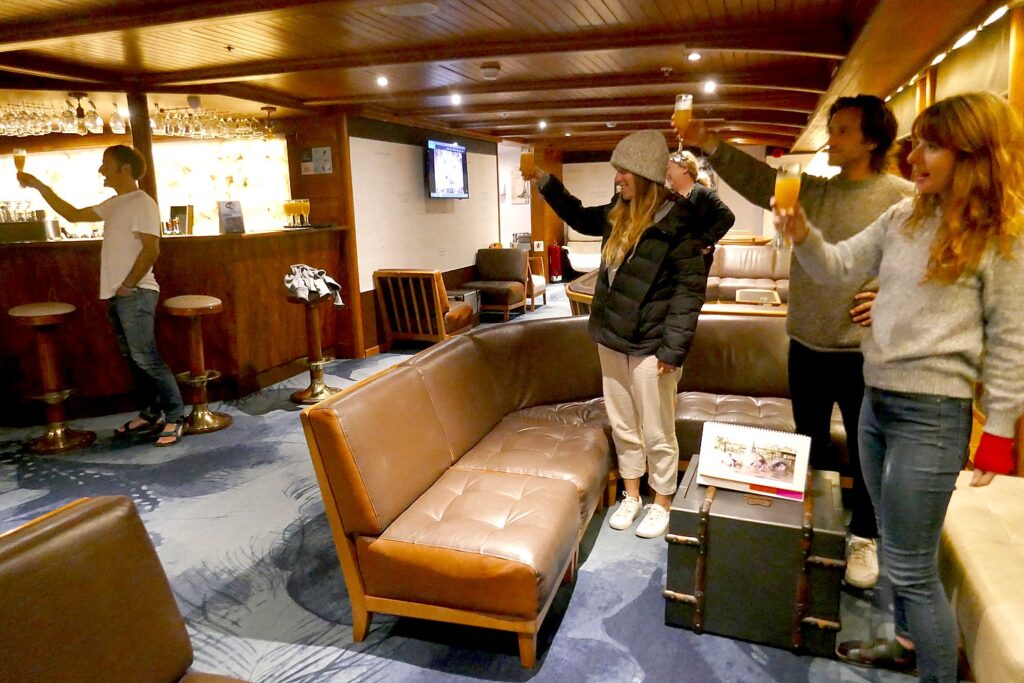
Galápagos is wonder-full to visit any time of the year. Because of the Islands’ location on the Equator, the air and water temperatures remain relatively stable all year long. During peak seasons (mid-June through early September, and mid-December through mid-January), it is particularly important to make your travel arrangements well in advance.
Go Galapagos, an alliance of Kleintours and Gala Tours, is a cruise and tour operator with more than 34 years of experience, offering excellent price/quality value for 3, 4, 7 and -night inclusive cruises (two guaranteed weekly departures), You can also combine the cruise with land packages in the Galapagos, in Ecuador, and in Peru.
In addition to the Galapagos Legend, Go Galapagos also has two yacht-style ships, Coral I and Coral II.
Go Galapagos by Kleintours, Av. Eloy Alfaro N° 34-111 & Catalina Aldaz. 170515, Quito – Ecuador, Ph: (593) 2 – 2267000 / (593) 2 – 2267080, USA: 1-888 50 KLEIN, www.GoGalapagos.com.
Here are more helpful links:
See also:
CRUISING ON THE GALAPAGOS LEGEND: A VOYAGE OF WONDER
SANTA CRUZ ISLAND IS WONDER-FUL START TO GALAPAGOS ADVENTURE
CRUISING ON THE GALAPAGOS LEGEND: SANTIAGO ISLAND
__________________
© 2022 Travel Features Syndicate, a division of Workstyles, Inc. All rights reserved. Visit goingplacesfarandnear.com, www.huffingtonpost.com/author/karen-rubin, and travelwritersmagazine.com/TravelFeaturesSyndicate/. Blogging at goingplacesnearandfar.wordpress.com and moralcompasstravel.info. Visit instagram.com/going_places_far_and_near and instagram.com/bigbackpacktraveler/ Send comments or questions to [email protected]. Tweet @TravelFeatures. ‘Like’ us at facebook.com/NewsPhotoFeatures
